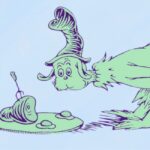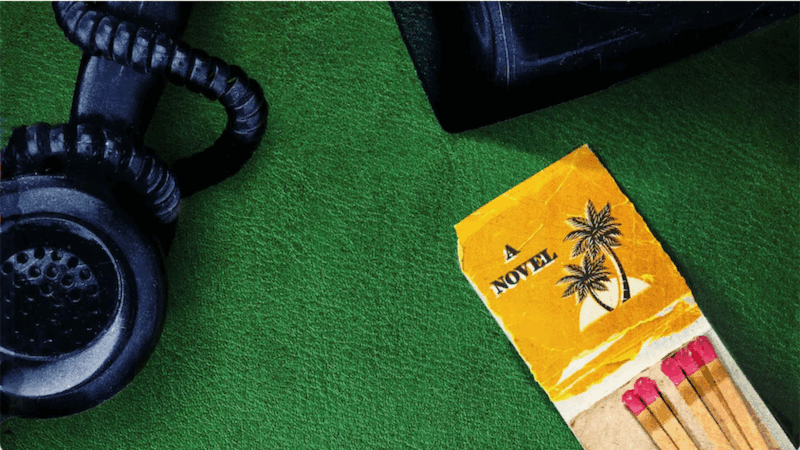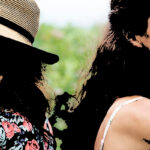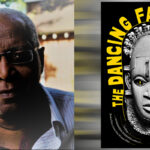Lit Hub’s Most Anticipated Books of 2019
What We're Looking Forward to, the First Half and Then Some
2018 was a year of ups and downs, and I expect no less from 2019. But whatever else the new year brings, it will also bring a slew of good books, including buzzy debuts (Sophie Mackintosh! Kristen Roupenian! T Kira Madden!), long-awaited returns (Elizabeth McCracken! Arundhati Roy!), plenty of exciting new releases from beloved writers (Sally Rooney! Helen Oyeyemi! Marlon James!), and everything in between. There’s so much good stuff heading our way that it was tough to narrow down our picks. Actually, as you’ll see, we didn’t do all that great on the narrowing front. Which only means: more books for you to be excited about. So now, without any further ado, here are Literary Hub’s most anticipated books of 2019 (so far)—look out for another installment this summer. NB: All dates listed subject to change at the whims of the publishers in question.
JANUARY
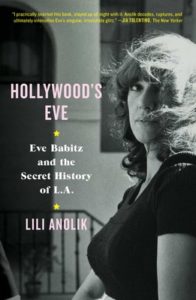 Lili Anolik, Hollywood’s Eve: Eve Babitz and the Secret History of L.A.
Lili Anolik, Hollywood’s Eve: Eve Babitz and the Secret History of L.A.
Scribner, January 8
Twenty years ago, after a car accident left public personality and writer Eve Babitz covered in burns, she largely drew back from public view. Lili Anolik pursued Babitz for years in an effort to tell her story after falling in love with Babitz’s writing; the result is an investigative, nuanced look at her story, intertwined with the sex and celebrity of Los Angeles life in the 1960s and 70s. (Corinne Segal)
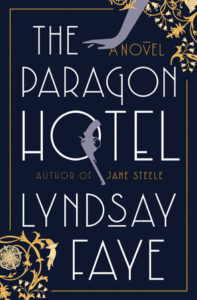 Lyndsay Faye, The Paragon Hotel
Lyndsay Faye, The Paragon Hotel
Putnam, January 8
Lyndsay Faye continues her reign as the queen of smart, feminist historical crime writing with her Oregon-set The Paragon Hotel, in which a refugee from the Mafia washes up on the Pacific Coast in 1921 only to find herself engaged in battle with the powerful local branch of the KKK. I can’t wait to follow Faye’s colorful characters in their battle against American-brand evil. (Molly Odintz)
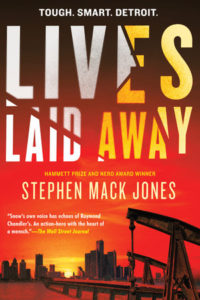 Stephen Mack Jones, Lives Laid Away
Stephen Mack Jones, Lives Laid Away
Soho, January 8
Stephen Mack Jones’s August Snow is still making waves as one of the most innovative and exciting new PI novels to come around in some time, a bold new take on the classic form and a much-deserved spotlight on Detroit. In this new installment, August Snow is the only man who knows Mexicantown well enough to investigate a human trafficking ring taking advantage of ICE raids. This is noir as it was meant to be: incisive, socially conscious, distinctly situated, and told with real style. (Dwyer Murphy)
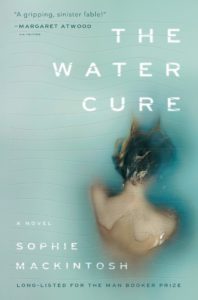 Sophie Mackintosh, The Water Cure
Sophie Mackintosh, The Water Cure
Doubleday, January 8
A dreamlike, hypnotic novel, sometimes lovely but more often terrifying, in which we meet three sisters raised to believe that their bodies are both vulnerable and dangerous—but not so dangerous as the world beyond their small island, and not half so dangerous as the bodies of men. But when men from that outside world do intrude, as of course they must in stories like these, the sisters begin to figure out the truth—of desire, of safety of their past, of their parents—for themselves. (Emily Temple)
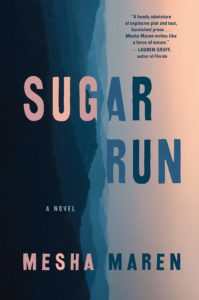 Mesha Maren, Sugar Run
Mesha Maren, Sugar Run
Algonquin, January 8
There’s an awful lot of talk about the underrepresentation of rural (or suburban, or urban) working class life in the higher echelons of American literary culture. And while to some extent that might be true, the stories are there, as are the writers, we just need to pay attention. To wit, Mesha Maren’s debut novel, about a young woman’s return to rural West Virginia after 18 years in prison, deserves your attention. (Jonny Diamond)
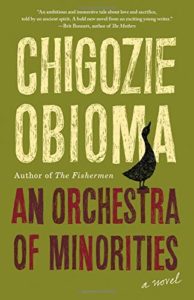 Chigozie Obioma, An Orchestra of Minorities
Chigozie Obioma, An Orchestra of Minorities
Little, Brown, January 8
The latest novel from Man Booker finalist and author of The Fishermen follows a Nigerian poultry farmer on a quest to win the hand of the woman he loves—which means selling everything he owns to go to college. But when he gets to the school, he discovers he’s been tricked, and all of a sudden, his journey towards true love gets a whole lot longer. (ET)
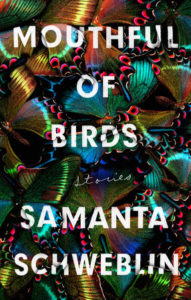 Samanta Schweblin, tr. Megan McDowell, Mouthful of Birds
Samanta Schweblin, tr. Megan McDowell, Mouthful of Birds
Riverhead, January 8
Schweblin’s Fever Dream had everyone in the Literary Hub office glued to their couches—with every light in the house burning—in 2017. Despite its slimness, we could talk of no other book for weeks, and her first collection to be translated into English promises to be equally terrifying and equally riveting. In “Headlights,” the first of the 20 stories, a bride is abandoned by her brand new husband on the side of the road after stopping to pee. From the field beyond comes a pack of jilted, angry brides to welcome her in. Thus begins a surreal and uncanny and perfectly discomfiting collection that will likely keep us all up for many nights to come. (ET)
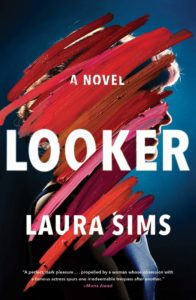 Laura Sims, Looker
Laura Sims, Looker
Scribner, January 8
This debut is a penetrating and unsettling psychological thriller. A woman’s fixation on her neighbor, a well-known actress, goes from unhealthy to something far more sinister after the women meet at a summer block party. It’s a novel about identity, appearances, and envy, and it’s one of the season’s most timely reads, an innovative experiment in what a thriller can be. (DM)
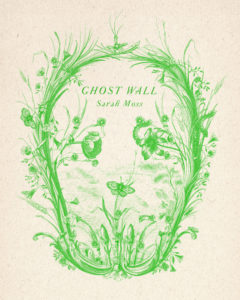 Sarah Moss, Ghost Wall
Sarah Moss, Ghost Wall
FSG, January 8
We might all think we want to go back to simpler times, but Ghost Wall could have you thinking again. In this story, a young woman joins her obsessive father and his anthropology students for their Iron Age reenactment. They use survival skills, work with primitive tools, and learn about rituals of the past. Then they build their own ghost wall, out of sticks and ancestral skulls. That’s when they really begin to learn something about the past, being human, and the sacrifices you have to make. (Katie Yee)
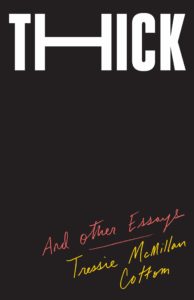 Tressie McMillan Cottom, Thick: and Other Essays
Tressie McMillan Cottom, Thick: and Other Essays
The New Press, January 8
With biting wit and wisdom, Tressie McMillan Cottom writes about everything from beauty to Trump in this collection of personal essays. Praised by Roxane Gay and compared to the work of Rebecca Solnit and bell hooks, Thick is a bold first collection that takes a scalpel to our society and probes the personal and the political. Also, it has its own playlist. (KY)
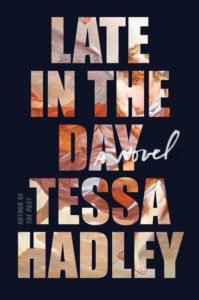 Tessa Hadley, Late in the Day
Tessa Hadley, Late in the Day
Harper, January 15
Hadley’s sixth novel explores the relationships between two couples (and longtime friends) as they mourn the death of one of their own. The novel moves between past and present to trace the characters’ relationships over time, as well as the destruction wrought by grief. I love a well-drawn portrayal of complex group dynamics, so I’m looking forward to this one for when I’m in the mood for some emotional intensity. (Jessie Gaynor)
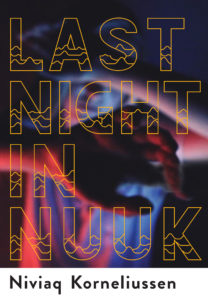 Niviaq Korneliussen, Last Night in Nuuk
Niviaq Korneliussen, Last Night in Nuuk
Black Cat, January 15
This remarkable debut novel took Scandinavia by storm with its vivid up-to-date portrait of life in Greenland. Skipping between five characters, from a woman who has just sworn off men to another coming out the other side of gender reassignment surgery, it assembles itself before your eyes, just as its characters do, caught, as often so many of us are, between what we are and what we are supposed to be. Emails and Facebook messages mix with conventional narration, chronicles of parties and their gritty aftermath, producing a jittery, tense texture that feels a lot more like modern life, and yet you emerge with a strong feeling that the novel of the future might look a lot like this one because of the depths of character it produces with such energy and charm. (John Freeman)
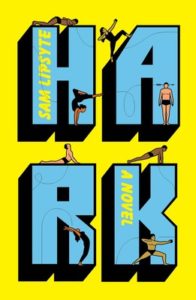 Sam Lipsyte, Hark
Sam Lipsyte, Hark
Simon & Schuster, January 15
Sam Lipsyte’s Home Land is one of the funniest books I’ve ever read. It was the first book I gave my fiancé, and it was 100% just a gift and not a humor test. If Lipsyte started writing sponsored content for air filtration devices, I would probably read it. Luckily, he wrote a new novel instead! Hark is a satire about an “unwitting mindfulness guru” (guru culture—endlessly fascinating!) who is ill-prepared for the messianic status he attains. I can’t wait to read it, then probably buy it for everyone as a thoughtful gift that is in no way a test. (JG)
 Kristen Roupenian, You Know You Want This
Kristen Roupenian, You Know You Want This
Scout Press, January 15
The hotly anticipated full collection from the writer who set the internet ablaze with “Cat Person” will surprise some readers—it’s much more heavily weighted towards horror than it is towards realist social dynamics. That is, unless you consider a woman who desperately wants to bite those around her, but particularly this one sexual harassing jerk at her office, as a realist social dynamic . . . which I have to admit I sort of do. (ET)
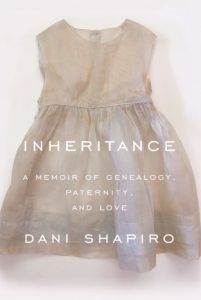 Dani Shapiro, Inheritance: A Memoir of Genealogy, Paternity and Love
Dani Shapiro, Inheritance: A Memoir of Genealogy, Paternity and Love
Knopf, January 15
In this memoir, Shapiro discovers that despite being her “father’s daughter,” she is, in fact, not—at least in the traditional sense—when a DNA test reveals she doesn’t share any genes with her father’s side. After learning she was a “test tube tot,” Shapiro unpacks a beautiful and heartbreaking narrative of paternity, genetics, and family. (Emily Firetog)
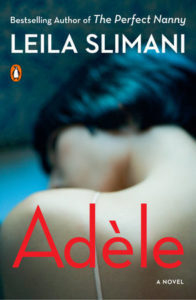 Leila Slimani, tr. Sam Taylor, Adèle
Leila Slimani, tr. Sam Taylor, Adèle
Penguin, January 15
She appears to have the perfect life: a family with her surgeon husband, a gorgeous apartment. But the 35-year-old heroine of Leila Slimani’s latest novel is bored in her marriage and has begun living a complex double life. Sneaking out of work for sex with men. Putting the numbers of those she’d go to bed with again on a secret second mobile phone. Gradually, her risks get bigger as she seduces even her husband’s colleague, her boss, men she’s not even attracted to. Over the course of this novel it becomes clear the fever of her pursuit of sex has tipped over into an obsession. Once again Slimani unveils a story which reads us and our moral reactions as we turn its pages. (JF)
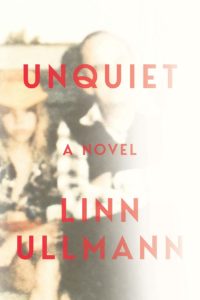 Linn Ullmann, tr. Thilo Reinhold, Unquiet
Linn Ullmann, tr. Thilo Reinhold, Unquiet
W. W. Norton, January 15
Drawing from a conversation she had with her father, the late filmmaker Ingmar Bergman, this exquisite and warm novel is a family story told in reverse. The book’s narrator plans to write a book with her father, a well-known director, and begins the research, journeying out to the island home where she spent time as a child growing up. Seven years later, after his death, Ullmann’s heroine comes back to the material and begins to realize how much it has changed with time, how unstable even the basic facts can feel when time bends hit in middle age. This is a very good book about motherhood, its joys and terrors, about the difficulty of no longer being a living person’s child. Of how that departure is not entirely replaced by family-making of one’s own. Among Norway’s contemporary writers, Ullmann might be the finest sentence by sentence. Here she blasts her story into fragments and puts it back together, piece by piece, with the artistry of someone who has always secretly known the broken things are most beautiful. (JF)
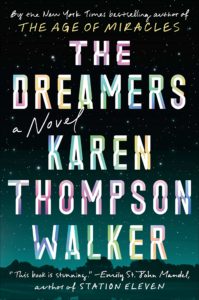 Karen Thompson Walker, The Dreamers
Karen Thompson Walker, The Dreamers
Random House, January 15
Walker’s bestselling debut, The Age of Miracles, imagined what might happen if the earth’s rotation began to slow. Her second book also features a mysterious widespread affliction, though a much less global one: here, a mysterious sleep epidemic strikes a California town, as one, then 22, then 500, then almost the entire town falls into a deep slumber. They don’t appear to be in pain, but they cannot be wakened. And then they begin to dream. (ET)
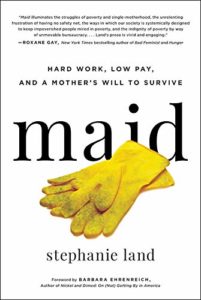 Stephanie Land, Maid: Hard Work, Low Pay, and a Mother’s Will to Survive
Stephanie Land, Maid: Hard Work, Low Pay, and a Mother’s Will to Survive
Hachette, January 22
“My daughter learned to walk in a homeless shelter,” Land tells us in this affecting debut memoir about life as a single mother living in poverty after having escaped an abusive relationship. Land describes working as a part-time housekeeper, cleaning the houses of those better off (but not necessarily happier) than she, the casual disregard Americans fling at those who are poor (like cruelty from strangers who saw her using food stamps), and the dream of being a writer and love for her daughter that got her through it all. (ET)
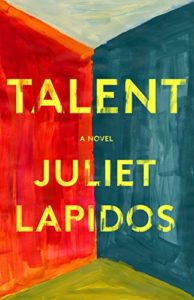 Juliet Lapidos, Talent
Juliet Lapidos, Talent
Little, Brown, January 22
Lapidos’s debut novel tells the story of an uninspired grad student (attempting to write a thesis on—what else—inspiration) who develops an obsession with the notebooks of an author who was himself stricken with writer’s block. It sounds both funny and creepy, which is a tricky combination that, when handled well, is one of my favorites. (Also, let’s be honest—who doesn’t want to read about someone else struggling to write?) (JG)
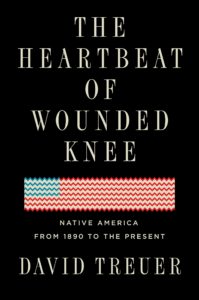 David Treuer, The Heartbeat of Wounded Knee
David Treuer, The Heartbeat of Wounded Knee
Riverhead, January 22
Billed as a “sweeping history—and counter-narrative—of Native American life from the Wounded Knee massacre to the present” this book is both those things and maybe more. Treuer, who is Ojibwe, from the Leech Lake Reservation in northern Minnesota, is a wonderful novelist, and if anybody can tell this story in the way it needs to be told and retold, until the end of time, he can. (JD)
 Benjamin Dreyer, Dreyer’s English: An Utterly Correct Guideline to Clarity and Style
Benjamin Dreyer, Dreyer’s English: An Utterly Correct Guideline to Clarity and Style
Random House, January 22
The internet’s grammarian-in-chief also happens to be a real, live copy chief, for a book publishing concern called Random House. The nice thing about Dreyer’s approach to all things copy related is that he is neither doctrinaire nor wishy-washy, and anyone who cares a wit about the elegance of language ought to have this on their shelf. (And now I am very anxious about hyphen placement—and absence—in this blurb.) (JD)
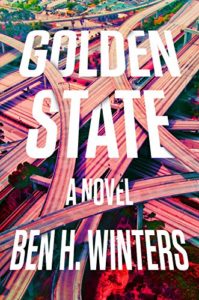 Ben H. Winters, Golden State
Ben H. Winters, Golden State
Mulholland, January 22
From the modern master of speculative noir comes a new version of alternate reality in which lies are outlawed, and only those who work for the “Speculative Service” are allowed to . . . well, speculate. Winters always finds a way to get at a larger truth about our present even as he plays games with what we consider to be an acceptable form of reality, and his new work is sure to delight in the science fiction and crime worlds. (MO)
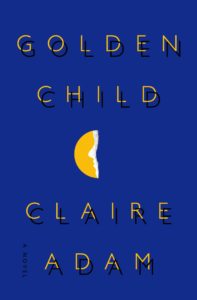 Claire Adam, Golden Child
Claire Adam, Golden Child
SJP for Hogarth, January 29
The second book published by Sarah Jessica Parker’s new imprint is a fierce debut set in Trinidad that revolves around a pair of twin boys—one good and one bad—and the impossible choice that their father must make. Which boy to save: the genius or the rebel? (ET)
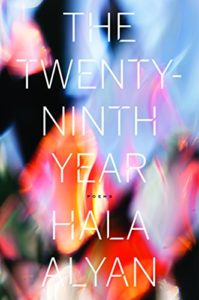 Hala Alyan, The Twenty-Ninth Year
Hala Alyan, The Twenty-Ninth Year
Mariner, January 29
Alyan’s forthcoming poetry collection examines her 29th year as a particular milestone in her life and all that that kind of reflection entails: lost loves, old friends, trauma and joy, lives led on multiple continents… This is the stuff of life, the very essence of the poetic. (JD)
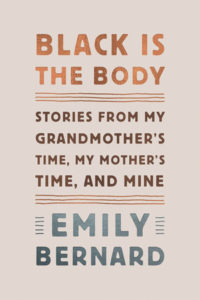 Emily Bernard, Black is the Body: Stories of My Grandmother’s Time, My Mother’s Time, and Mine
Emily Bernard, Black is the Body: Stories of My Grandmother’s Time, My Mother’s Time, and Mine
Knopf, January 29
Bernard’s quasi-memoir is a beautiful and important examination of race through her lived experience—from growing up black in the South and getting a PhD from Yale to marrying a white man and adopting children from Ethiopia. Bernard is a clear and confident writer, forthcoming with her own uncertainties and the ambiguities of how race plays into her relationships with her own history as well as her relationship with others. (EF)
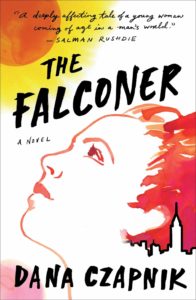 Dana Czapnik, The Falconer
Dana Czapnik, The Falconer
Atria, January 29
You may not think we need any more coming-of-age stories set in New York City, but this book—about a 17-year-old “pizza bagel” (read: half-Italian, half-Jewish) girl in love with her best friend—may just change your mind. (ET)
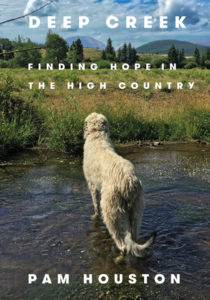 Pam Houston, Deep Creek
Pam Houston, Deep Creek
W. W. Norton, January 29
In this book of essays, the celebrated author of Cowboys Are My Weakness pays eloquent, tough-talking homage to her 120-acre ranch in the Colorado Rockies—and the animals and plants that live on it. Houston is one of our best writers about the natural world around us and our place in it, and here she’s writing about that patch of world closest to her heart. We could all benefit from these lessons. (ET)
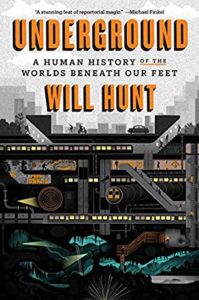 Will Hunt, Underground: A Human History of the Worlds Beneath Our Feet
Will Hunt, Underground: A Human History of the Worlds Beneath Our Feet
Spiegel & Grau, January 29
A thoughtful and often romantic examination of humanity’s relationship to underground spaces—the Paris catacombs, the New York City subway tunnels, ancient Australian mines, caves, bunkers, tombs, and hidden cities. This is no travel guide, but a historical and philosophical examination the dual nature of what’s beneath us: since the birth of civilization, the underground has been a subject of fascination and fear, a symbol of birth and of death, of deprivation and of abundance, for the humans who walk above it. It remains a mystery, but this book brings us a little closer to illuminating the darkness. (ET)
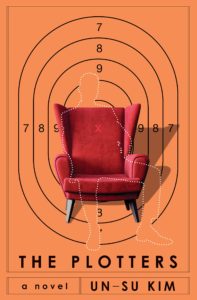 Un-su Kim, The Plotters
Un-su Kim, The Plotters
Doubleday, January 29
This stylish thriller follows a professional assassin who works for a host of shadowy underworld kingpins known as “plotters,” but soon begins to question the morality of his profession. With such literary touches as a library headquarters for assassins, this one may pander a bit to bookish audiences—and I’m all in favor of that. (MO)
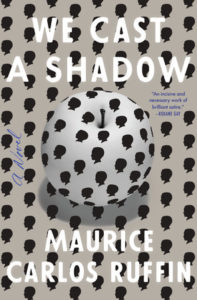 Maurice Carlos Ruffin, We Cast a Shadow
Maurice Carlos Ruffin, We Cast a Shadow
One World, January 29
Working at a prestigious law firm in the south in the near future, the narrator of this blisteringly intelligent debut faces a terrible choice. The arc of justice, even for one as successful as himself, has become more of a downslope. He still gets stopped routinely by police, and their televised abuse of other men less employed than him has become sadistic. He also faces the usual insinuating as to why exactly he was hired. And so when he begins to hear that a procedure has developed which can slowly bleach his biracial son’s blackness out of him, Ruffin’s narrator seriously considers it. What follows is less a satire than a full-throated novelistic debut of ferocious power and grace. Anyone reading a literary journal in the last few years knows Maurice Carlos Ruffin can write a killer essay on just about any topic. Here, though, is exactly what he is for—telling a story that refracts the insanity of the world into a shape so unique you wonder how this book wasn’t there all along. (JF)
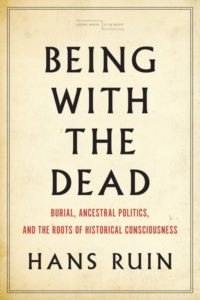 Hans Ruin, Being with the Dead: Burial, Ancestral Politics, and the Roots of Historical Consciousness
Hans Ruin, Being with the Dead: Burial, Ancestral Politics, and the Roots of Historical Consciousness
Stanford, January 29
I’m finishing up my second viewing of Six Feet Under, and Thomas Laqueur’s astounding 2014 tome The Work of the Dead: A Cultural History of Mortal Remains is still one of my favorite books about death, the dead, the dying. It sounds like philosopher Hans Ruin’s Being With the Dead will be a worthy spiritual companion. It’ll explore everything from mortuary rituals to the drive for longevity. The social bonds between the living and the dead are about as timeless as a subject can get. (Aaron Robertson)
FEBRUARY
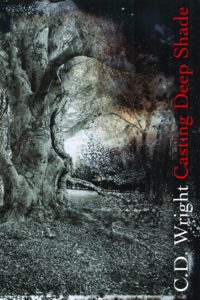 C. D. Wright, Casting Deep Shade
C. D. Wright, Casting Deep Shade
Copper Canyon, February 2
Before she died unexpectedly in 2016, C. D. Wright completed this vaulting meditation on humanity’s relationship to the beech tree. Imagine a poetic Walden written by an author with less ego to discard and you’ll begin approaching the strangeness and wonder of these poems. Trees, scientists are beginning to learn, can talk to each other at a cellular level. Here’s a book that attempts to listen. Wright was born the daughter of a court stenographer in the Ozarks, so she knows how to turn an ear. She spent years visiting various trees, some of which were special to friends, others that had accumulated folklore. She remembers and addresses trees which were important in her life. Finally, she spoke with arborists. The result is a moving and deeply unique volume. If you haven’t read one of Wright’s books, the first thing you’ll notice is no one writes like her. The oracular stony-faced lyricism that is somehow also warm. Her way of stitching together observation without articles or transitions, as if knowing you’ll be right there with her. Even now—especially now—that the best of her is brought to us on the bookish afterlife of trees. (JF)
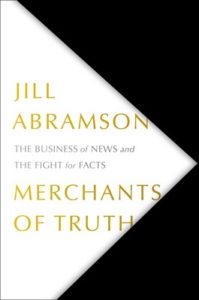 Jill Abramson, Merchants of Truth
Jill Abramson, Merchants of Truth
Simon & Schuster, February 5
Former Executive Editor of The New York Times Jill Abramson paints a nuanced picture of the current state of news media by following four companies—The New York Times, The Washington Post, BuzzFeed, and VICE—over the last decade. A useful book in this bizarre moment where the President of the United States has declared (stupid, dangerous) war on the Fourth Estate. (ET)
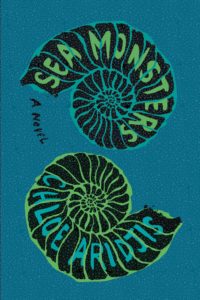 Chloe Aridjis, Sea Monsters
Chloe Aridjis, Sea Monsters
Catapult, February 5
Guggenheim Fellow Chloe Aridjis’ new novel paints a hallucinatory picture of 1980s Mexico, following a 17-year-old girl named Luisa who boards a bus to the Pacific with a boy she barely knows in an attempt to pursue an unusual obsession: she wants to track down a troupe of Ukrainian dwarfs, escapees from a Soviet circus touring Mexico. Luisa settles in a beach community in Oaxaca, where her dreams grow surreal and she begins to disappear into Zipolite, “The Beach of the Dead.” As if all that mystery and longing isn’t enough, the novel pulses to the soundtrack of Joy Divison, Nick Cave and the Bad Seeds, and Siouxsie and the Banshees. Suffice it to say, I can’t wait to get my hands on it. (Miriam Kumaradoss)
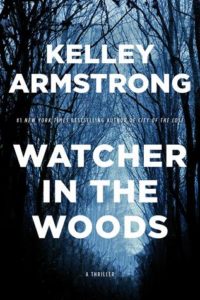 Kelley Armstrong, Watcher in the Woods
Kelley Armstrong, Watcher in the Woods
Minotaur, February 5
Kelley Armstrong’s latest chiller takes us into a one-horse town located in Yukon, Alaska, where the town’s sole policewoman must investigate a murder while keeping her town full of outlaws and shut-ins safe from the outside world. (MO)
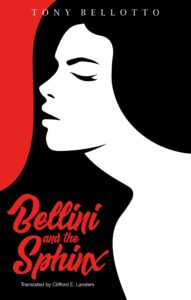 Tony Bellotto, tr. Clifford E. Landers, Bellini and the Sphinx
Tony Bellotto, tr. Clifford E. Landers, Bellini and the Sphinx
Akashic, February 5
Bellini and the Sphinx is the American debut for the wildly popular Sao Paulo-based crime series written by Bellotto, the celebrated Brazilian guitarist and writer. His private eye, Remo Bellini, is a conscious homage to Philip Marlowe and the classic noir American detectives, but with an identity all his own and a milieu, the streets of Sao Paulo, that are as alive and mysterious as any you’ll come across in the genre. American readers have waited too long for this, but they’ll finally get the chance to visit Brazil through Bellott/Bellini’s eyes. (DM)
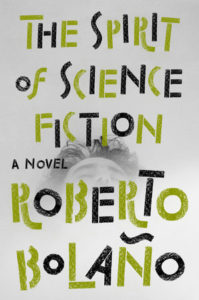 Roberto Bolaño, tr. Natasha Wimmer, The Spirit of Science Fiction
Roberto Bolaño, tr. Natasha Wimmer, The Spirit of Science Fiction
Penguin Press, February 5
Are you a Bolaño completionist? I am. Somebody please get this for me and call it a Valentine? (JD)
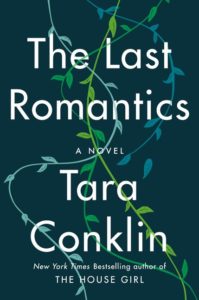 Tara Conklin, The Last Romantics
Tara Conklin, The Last Romantics
William Morrow, February 5
It’s the year 2079, and the world is not the same as it used to be. A 102-year-old poet tells the story of her life and the lives of her siblings, starting with “the Pause,” those years their mother was too depressed to emerge from her room, and moving through their childhoods and adult lives. Read: a classic coming-of-age family novel told from the vantage of a climate-changed earth. Possibly not the last of its kind. (ET)
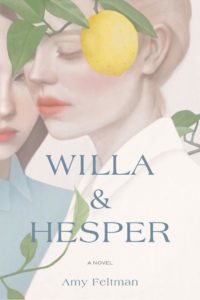 Amy Feltman, Willa and Hesper
Amy Feltman, Willa and Hesper
Grand Central, February 5
Feltman tracing the paths of two young queer women (the titular Willa and Hesper): the rise and fall of their romance, the respective paths they take to mend their broken hearts (leading them to their ancestral lands of Tbilisi, Georgia, and the war sites of Germany) and their reckoning (or refusal to reckon with) their privilege. I’m always here for portrayals of 21st century queer life, and Willa and Hesper looks to be an excellent addition to the genre. (MK)
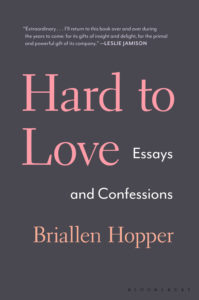 Briallen Hopper, Hard to Love: Essays and Confessions
Briallen Hopper, Hard to Love: Essays and Confessions
Bloomsbury, February 5
A compelling, smart collection of essays on relationships of many kinds—hoarding, dependence, female friendship, marriage or lack thereof—from a widely published literary scholar. (ET)
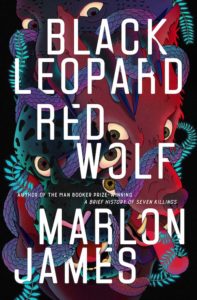 Marlon James, Black Leopard, Red Wolf
Marlon James, Black Leopard, Red Wolf
Riverhead, February 5
Marlon James is back, and this time he’s got a trilogy! Black Leopard, Red Wolf, the first book in the Dark Star trilogy, brings together African history, mythology, and fantasy, and follows a mercenary named Tracker who’s hired to find a boy who has been missing for three years. Breaking his own rule about working alone, he links up with a hodgepodge band that includes a shape-shifting man-animal named Leopard. James does mystery, dread, and weirdness excellently, and Black Leopard, Red Wolf is likely to raise the bar even higher. It also doesn’t hurt that it has a stunning cover. (MK)
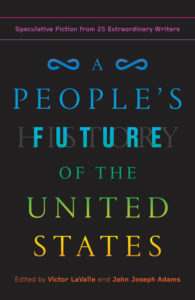 Victor LaValle, and John Joseph Adams eds., A People’s Future of the United States: Speculative Fiction from 25 Extraordinary Writers
Victor LaValle, and John Joseph Adams eds., A People’s Future of the United States: Speculative Fiction from 25 Extraordinary Writers
One World, February 5
A literary collection boasting speculative stories from N. K. Jemisin, Alice Sola Kim, G. Willow Wilson, Charles Yu, Charlie Jane Anders, Leslie Nneka Arimah, Tananarive Due, Maria Dahvana Headley, Catherynne M. Valente, and many more. According to the publisher, the brief was that each story should “challenge oppressive American myths, release us from the chokehold of our history, and give us new futures to believe in. They also asked that the stories be badass.” Assuming all these stories meet those criteria (which I do, because again, look at that lineup), this volume should be a genre-bending knockout. (ET)
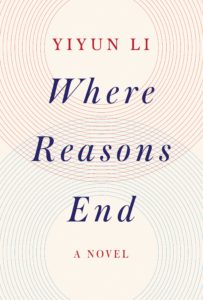 Yiyun Li, Where Reasons End
Yiyun Li, Where Reasons End
Random House, February 5
Li, who has won every award including the PEN/Hemingway Award and a MacArthur Foundation fellowship, is a writer of near-perfect sentences. In this book that’s totally inappropriate for a new parent, a mother and her 16-year-old son who committed suicide exchange letters to one another. An imagined life in a timeless world allows for a new sort of reality, and a unique meditation on loss and love. (EF)
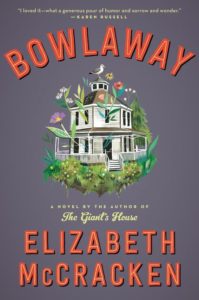 Elizabeth McCracken, Bowlaway
Elizabeth McCracken, Bowlaway
Ecco, February 5
Talk about anticipated—McCracken hasn’t published a novel in almost 20 years, since 2001’s Niagara Falls All Over Again, which was preceded by her celebrated debut The Giant’s House. Bowlaway opens with a woman named Bertha, who appears to have fallen out of the sky into a cemetery in a small Massachusetts town with a bowling ball in her purse. Eventually, she marries and starts a candlepin bowling alley (claiming she invented the game), a place that, over the years, draws the whole odd town, each member with their own quirks and love stories and tragedies and treasure maps and obscure deaths and estrangements and successes—well, it’s a whole town, like I said. (ET)
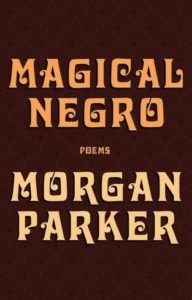 Morgan Parker, Magical Negro
Morgan Parker, Magical Negro
Tin House, February 5
Morgan Parker’s poetry is vital, in both senses of the word. Her most recent collection, There Are Things More Beautiful Than Beyoncé, was an absolute knockout—a breathtaking exploration of black womanhood, culture both pop and past, bodies, minds. Poetry’s defenders need not answer those who would sing its dirges, but if they did, Parker’s work could serve as an indisputable response. (JG)
 Sylvia Plath, Mary Ventura and the Ninth Kingdom
Sylvia Plath, Mary Ventura and the Ninth Kingdom
Harper Perennial, February 5
I once heard a man-poet tell a whole room full of undergrads that Sylvia Plath was overrated. What a dork! I’m still angry about that! Sylvia Plath is fantastic and I am very excited to read this newly discovered story. I don’t even care what it’s about! Oh wait, it’s a dark allegory about female agency? Sign me up times two! (JG)
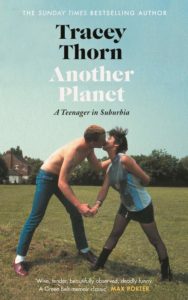 Tracey Thorn, Another Planet: A Teenager in Suburbia
Tracey Thorn, Another Planet: A Teenager in Suburbia
Canongate, February 7
Until the time came to write this list, I had no idea that Tracey Thorn, the vocalist for Everything But the Girl and collaborator on several Massive Attack songs, is also a writer. As it turns out, Another Planet is her third book. In it, she looks back at her static youth in English suburbia, a place where “nothing seemed to move” but that spawned several artists (including Thorn herself) regardless. Another Planet should appeal not just to fans of Everything But the Girl or Massive Attack, but to anyone who grew up in suburbia, immersing themselves in art and waiting to escape and make their own, less predictable life. (MK)
 Esmé Weijun Wang, The Collected Schizophrenias
Esmé Weijun Wang, The Collected Schizophrenias
Graywolf, February 5
Wang’s debut essay collection, which follows her wonderful, pitch black novel The Border of Paradise, is a candid, unsentimental exploration of her life with a bipolar schizoaffective disorder compounded by chronic illness. The essays follow Wang from her diagnosis to the disputes of the medical community to personal experiences and discoveries—like the power of fashion (a good outfit can convince anyone that you’re normal). This collection is sure to shed light on a complex topic foreign to many—and it certainly won’t hurt that she’s a fantastic writer. (ET)
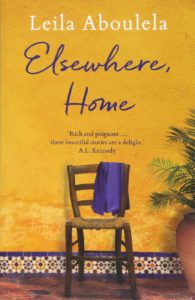 Leila Aboulela, Elsewhere, Home
Leila Aboulela, Elsewhere, Home
Grove Press, February 12
Leila Aboulela is one of the world’s best short story writers. Since winning the inaugural Caine Prize, the award which elevated Binyavanga Wainana, NoViolet Bulawayo, and Namwali Serpell (whose debut is finally here), Aboulela has assembled a small body of work of surpassing grace. This selection of her stories from the past twenty years beautifully conjures the vertigo of homesickness. In “Museum,” the Caine Prize winner, a well-to-do Sudanese woman studying overseas and a Scottish man go on an awkward first date to a gallery. “We did Islam in school,” he offers when she tells him what she misses of home. Aboulela excels at capturing the tentativeness of talk like this, the veering way people try to connect in lonely situations. She also understands how isolation can make you strange, fearful. In one tale, a housewife besotted with a trailblazing Muslim writer is roundly rejected when she projects too much on her idol. Yet another story depicts how a man’s relationship with his wife changes when she joins him in London from Sudan. “If you cover your hair in London they’ll think I’m forcing you to do that,” he explains. These are everyday stories observed with unusual sensitivity to the fine grains of hope that live in throwaway gestures. Most of the characters organize their lives around their Muslim faith. Not once do they ask of their characters to perform that faith for us: they just live it. (JF)
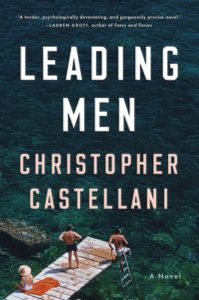 Christopher Castellani, Leading Men
Christopher Castellani, Leading Men
Viking, February 12
Castelliani’s fourth novel is catnip for readers who are also writers: in 1953 Italy, Tennessee Williams and his partner Frank Merlo meet 17-year-old actress Anja Bloom at a party thrown by Truman Capote. The three fall in with another couple: Jack, an alcoholic writer, and Sandro, who loves him—which could be enough: just a story about artists and their partners, trying to get along and make it in the middle of the century. But we also get to peek in ten years later, as Frank is dying, and again fifty years after that, when Anja has removed herself from the spotlight, but is hanging on to an unpublished play by Williams that she means to destroy—and that Sandro wants her to produce. (ET)
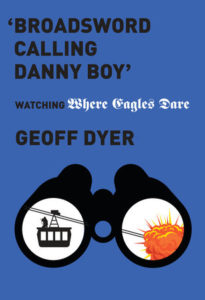 Geoff Dyer, Broadsword Calling Danny Boy
Geoff Dyer, Broadsword Calling Danny Boy
Pantheon, February 12
Geoff Dyer has spawned a number of genres in which he remains king, partly because no one else dared to write such books. The Novel Which May Not Be A Novel about Jazz Musicians (But, Beautiful); The Book in Which the Biographer Never Writes His Biography (Out of Sheer Rage). Dyer even gate-crashed the photography world and wrote The Book About a Unified Field Theory for How a Picture Works (The Ongoing Moment) and managed to say something new. Just as soon as Dyer masters a genre, however, he’s beetled off to a new one. Lately, he’s been writing The Book in Which the Author Watches a Film. Two years ago the movie at the center of that book was Tarkovsky’s Stalker (Zona), now Dyer has moved on to the Burton and Eastwood triumph, “Where Eagles Dare,” in which a drunk Shakespearean and his gun-twirling western pal team up to make one of the most fabulous men on a mission films of all time. Dyer loved this film as a child, but he doesn’t make the fatal sentimental mistake of worrying over the gap between that affection and what it feels like to see the film today. Instead he just drops right in and begins describing it. Like all of Dyer’s genres, it’s a deceptively difficult stunt to pull off—recreating what it’s like to watch a film in front of you, frame by frame. Dyer is one of the most stylish writers alive, though, and he’s great company. So even if you have no interest in “Where Eagles Dare,” by page two he’s entered some of its scenes, and made the picture move right there before you. As with all moving images, your eye can’t help but turn to it, and for a split second, you’ll forget this illusion was made by words. (JF)
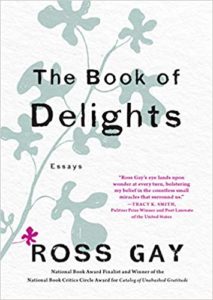 Ross Gay, The Book of Delights
Ross Gay, The Book of Delights
Algonquin, February 12
As a poet, Ross Gay writes gorgeously of the ways pleasure and joy marble pain. He has a sculpture’s eye too, which means he sees amidst the stone of experience shapes which could be—might be—there. His latest book, The Book of Delights, feels like a huge garden of such visions. The collection began as an attempt to write a daily essay on something which delighted him. They aren’t obvious sources of happiness. Random high fives in coffee shops; the sight of two people sharing the load of a shopping bag; pecans. Gay even writes about what happens when he brings a tomato seedling onto a flight. “I don’t know how to check that,” the security guys says, “have a good day.” The pleasure in these essays lies in the contagion of Gay’s way of turning a topic over and over in his hand, like some kind of un-fretful worry bead. Here, each one of these essays says, take a look at this, and you will. (JF)
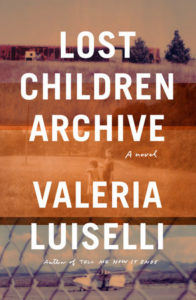 Valeria Luiselli, Lost Children Archive
Valeria Luiselli, Lost Children Archive
Knopf, February 12
Valeria Luiselli is one of the most fascinating and impassioned authors at work today. Her latest tells the story of a family embarking on a road trip from New York City to Arizona (the father to record echoes from the last place where the Chiricahua Apache lived, the mother to try and locate two little girls being held in a detention center on the border). A haunting hybrid of lyrical storytelling and political fury, the book is a powerful indictment of the cruelty and inhumanity inherent in the current American immigration system, and a vital work for the Trump era. (Dan Sheehan)
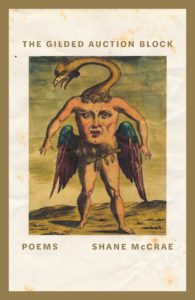 Shane McCrae, The Gilded Auction Block
Shane McCrae, The Gilded Auction Block
FSG, February 12
Early in the current administration there was a feeling voiced in public debate that we’d entered a post-literate space. A time beyond rational critique. Then people slowly realized poets had been predicting this kind of catastrophe. They had in fact been chronicling the America that would made Trump possible all along. Many were not recently clued in to the state of the state either. Nikky Finney, Lawrence Joseph, Natalie Diaz, Yusef Komunyakaa, the great WS Merwin. Claudia Rankine and Terrance Hayes and Robin Coste Lewis. One essential younger voice among this group is Shane McCrae, whose fifth collection is every bit the book our current moment demands and more as it interrogates the notion that this monstrosity has happened to us. “Gilded Auction Block” reaches into America’s past which is present and raises the living specter of white supremacy. Shows how it speaks. How it walks. In whose voice it lives. The fear of blackness it depends upon and spreads. How it has brought so much of the country in collusion with it. Ranging across years and modes, McCrae draws this insanity to the fore and has it speak to us in the voice of familiar names, such as Jefferson Davis or Sylvia Plath, shows how America addresses its nameless, too, its immigrants, the poor. McCrae is far more than history’s keen-eared mimic, though. He is, this book makes abundantly clear, one of poetry’s key archivists of America’s un-dead ghosts. How clearly he shows the state of the house we’ve been living in. (JF)
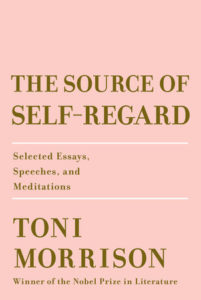 Toni Morrison, The Source of Self-Regard: Selected Essays, Speeches, and Meditations
Toni Morrison, The Source of Self-Regard: Selected Essays, Speeches, and Meditations
Knopf, February 12
I enjoyed Morrison’s recent The Origin of Others, a tiny volume based on a series of lectures about race, belonging and the arbitrary divisions between people. I’m going to keep soaking up Morrison’s “I’ve done all I needed to do and the rest is just treats” phase for as long as she’s writing, compiling, editing, thinking — doing all the things she does best, in other words. (AR)
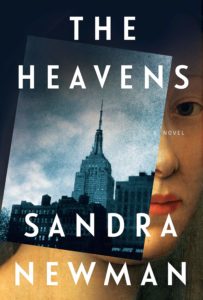 Sandra Newman, The Heavens
Sandra Newman, The Heavens
Grove Press, February 12
Newman’s latest novel begins in a mostly-familiar New York City, where Ben and Kate meet and fall in love. Simple enough, except that Kate has these dreams, mysterious, real-seeming dreams of Elizabethan England, and as the novel goes on, the “real” world begins to change overnight. Is Kate changing everything while she sleeps? I wolfed down this novel, which is smart and terrifying and delicious literary storytelling. (ET)
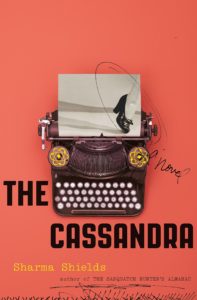 Sharma Shields, The Cassandra
Sharma Shields, The Cassandra
Henry Holt, February 12
Part of the recent boom of reimagined myths (see: The Mere Wife, Circe and Everything Under, among others), Sharma Shields’ novel The Cassandra reworks the Greek myth of Cassandra into the life of Mildred Groves, who (like her mythological counterpoint) is gifted and cursed with the ability to see the future. She runs away to work at the Hanford Research Center during WWII, and while she’s delighted at first to no longer feel like an outsider, her visions of what is to come grow increasingly nightmarish and force her towards a moral reckoning. Grappling with themes of violence and the patriarchy, The Cassandra looks to be both an intriguing reimagining of Greek and a novel that’s relevant to the times we live in. (MK)
 Yūko Tsushima, tr. Geraldine Harcourt, Territory of Light
Yūko Tsushima, tr. Geraldine Harcourt, Territory of Light
FSG, February 12
Originally published in 1979 in monthly installments, Territory of Light follows a young woman, recently divorced, who moves into a new apartment in Tokyo with her young daughter. The episodic chapters are intimate, claustrophobic reminders of how much can change in a year. The mother-child relationship is both beautiful and painful, calling to mind Days of Abandonment (but less Italian) or Jenny Offill’s Department of Speculation. (EF)
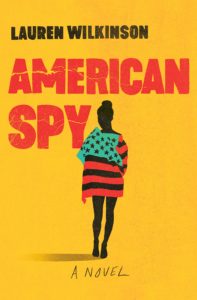 Lauren Wilkinson, American Spy
Lauren Wilkinson, American Spy
Random House, February 12
Wilkinson’s debut is a spy novel with deep explorations of political, racial, and sexual norms, or it’s a deeply intellectual novel disguised as a spy novel. In either case, Marie Mitchell, an African-American FBI agent who is recruited to undermine a foreign regime, is an unforgettable character, and the entire novel is an absolute page-turner. (EF)
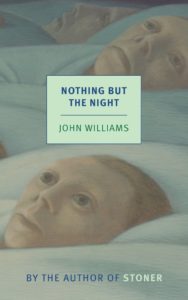 John Williams, Nothing But the Night
John Williams, Nothing But the Night
NYRB, February 12
John Williams’s Stoner is the only book I can think of that is famous for being not famous enough (according to some, anyway), and it has its devotees as well as its detractors. So I’m very curious about this reissue of Williams’s first novel, which NYRB describes as “a brooding psychological noir” about a young man hiding out from his life at the bottom of a bottle, and what happens when his estranged father comes to town. (ET)
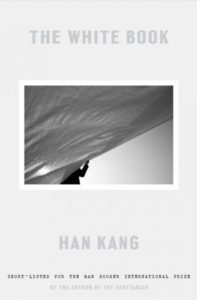 Han Kang, The White Book
Han Kang, The White Book
Hogarth, February 15
I adored Han Kang’s eerie English-language debut of denial, excess, and transformation, The Vegetarian, and I can’t wait to read her next tale, which promises to be equal parts Italo Calvino, Angela Carter, and something entirely Han Kang’s own. In The White Book, a writer in residency based in Warsaw contemplates the color white as a symbol for grief, for a quieter, yet just as intensely symbolic, follow-up to the startling violence of her first two books. (MO)
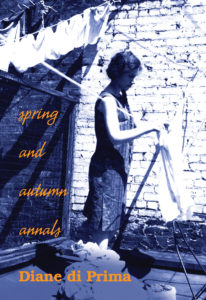 Diane di Prima, Spring and Autumn Annals and Revolutionary Letters
Diane di Prima, Spring and Autumn Annals and Revolutionary Letters
City Lights, February 19
This year, Diane di Prima will turn 85 and her volume in the immortal City Lights Pocket Poet series, Revolutionary Letters, is as relevant as ever. di Prima’s crotchety, yearning and oratory poetic voice is the sound of a mind ablaze with revolt. If someone were smart, they’d turn it into leaflets. It’d at least make people think. di Prima wasn’t always such an icon, though, and the reissues from City Lights bring us back to the period of her becoming. From the moment she dropped out of Swarthmore and moved to New York, di Prima had a knack for living her way into the red hot margin of things. In the 1950s she spent time with the Beats, which later turned into the subject of her book, Memoirs of a Beatnik. In the 1960s she was active in New York theatre and also edited The Floating Bear with Amiri Baraka, before moving to Stinson Beach and becoming a full-time spoke of the wheel of Bay Area poetic light. Autumn Annals sees all of this period through the wavy lens of grief. The book is a series of diaries di Prima wrote in tribute and mourning for her friend and Warhol Factory Member, Freddie Herko, who jumped to his death at age 29 in 1964. di Prima is writing to console herself, and her anguish and shock bleed over into how she sees the world. The urgency with which she must make decisions. To read these diaries now alongside di Prima’s Revolutionary Letters—begun in 1968 in a spirit of utopian hope and ecological terror—is to enter the intimate moral consciousness of a writer who acted where many simply just thought. “These are transitional years and the dues/will be heavy,” she writes in “Revolutionary Letter 10.” “The continent is a seed.” All this before Monsanto existed. By letter 102, her tone has changed, her technology updated: “Soon the only ones/who’ll know how to find us/will be Google/& those small surveillance drones.” (JF)
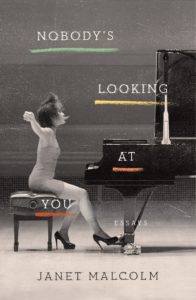 Janet Malcolm, Nobody’s Looking at You: Essays
Janet Malcolm, Nobody’s Looking at You: Essays
FSG, February 19
Malcolm is a brilliant critic, and her collected essays bring together some of her best narrative nonfiction pieces. Included here is everything from profiles of fashion designer Eileen Fisher and cable news host Rachel Maddow to an essay about email etiquette that, though written more than a decade ago, is still somehow relevant. (EF)
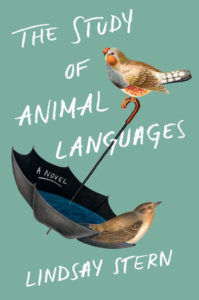 Lindsay Stern, The Study of Animal Languages
Lindsay Stern, The Study of Animal Languages
Viking, February 19
Don’t you love reading about a couple at the moment when their lives start to fall apart? Ivan and Prue are linguistics experts, but they’re having a hard time communicating with each other. Throw in a handsome colleague and a burdensome father-in-law named Frank, and you’ve got that unhappy family that’s unhappy in its own way. Lindsay Stern’s debut novel is an intimate look at love, language, and their limits. (Katie Yee)
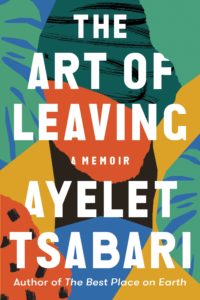 Ayelet Tsabari, The Art of Leaving
Ayelet Tsabari, The Art of Leaving
Random House, February 19
There are few things like a moving memoir of dislocation and relocation, and Ayelet Tsabari’s story of life after the death of her father promises to deliver. What does an Israeli girl with Yemeni origins feel when the country of her birth is hostile to the traditions of her ancestors? One answer is that she moves. What did Tsabari find in New York, Canada, Thailand and India? What drove her from one place and drew her to another? Where, the book seems to ask, does home end up being? (AR)
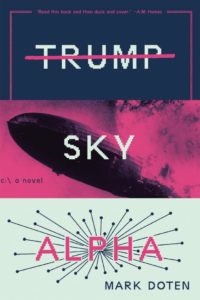 Mark Doten, Trump Sky Alpha
Mark Doten, Trump Sky Alpha
Graywolf, February 19
Mark Doten’s second novel is a contemporary dystopia (or just “contemporary,” I guess) about nuclear apocalypse, Trump, and Twitter (truly a Mad Libs of nightmares!). Obviously I’m concerned that it will already feel too prescient on its release, but as a social media editor, I’m always interested in reading about nightmarish internet wormholes. (JG)
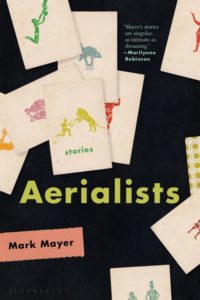 Mark Mayer, Aerialists
Mark Mayer, Aerialists
Bloomsbury Publishing, February 19
Through the nine stories in Aerialists, Mark Mayer recasts classic carnival characters as misfits seeking grandeur in a lonely world. Ranging from a friendless peach farmer conducting a funeral for an elephant, to a realtor for the super-rich invoking his inner murder clown, to a model-train hobbyist preparing to throw his miniature world in the trash, Aerialists is a collection of myths that have bled into the everyday. The collection looks like an intriguing circus of the beautiful, the freakish, and the poignant, among several other kinds of “American exaggerations.” (MK)
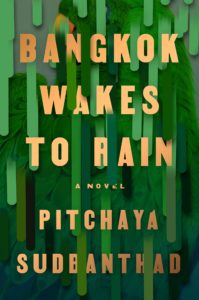 Pitchaya Sudbanthad, Bangkok Wakes to Rain
Pitchaya Sudbanthad, Bangkok Wakes to Rain
Riverhead, February 19
Sprawling over decades, Pitchaya Sudbanthad’s Bangkok Wakes to Rain weaves the stories of several different characters—from a musician playing for an audience of ghosts, to a student bleeding to death in the street after being stabbed by a lover, to a plastic surgeon designing a new face for a girl—into a portrait of an amphibious, ever-morphing Bangkok. There’s an excerpt from the novel on the Penguin Random House website, and if its lyricism and vividness are anything to go by, Bangkok Wakes to Rain already looks set to be one of 2019’s essential reads. (MK)
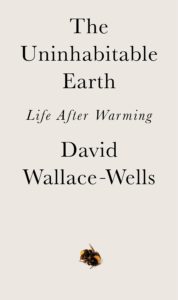 David Wallace-Wells, The Uninhabitable Earth
David Wallace-Wells, The Uninhabitable Earth
Tim Duggan Books, February 19
Remember that 7,500 word New York Magazine essay “The Uninhabitable Earth” that detailed the potential impacts of climate change if no action is taken to reduce greenhouse gas emission? That cheery piece full of worst case scenarios has been expanded to become Wallace-Wells first book, due out in April. (EF)
 Jen Beagin, Vacuum in the Dark
Jen Beagin, Vacuum in the Dark
Scribner, February 26
This is the story of 26-year-old Mona, a woman running from her troubled past, cleaning houses for a living in New Mexico. She gets a close look at the private lives of her clients, and their paths cross in messy, unexpected ways. Mona is a distinct character to follow, and it’s fascinating to see the world filtered through her. (Example: her nickname for God is Bob.) It’s funny and kind of gross (the first chapter is called “Poop”). Enjoy. (KY)
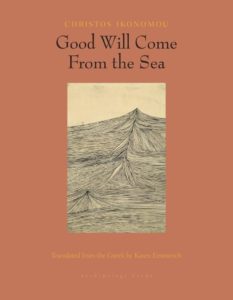 Christos Ikonomou, tr. Karen Emmerich, Good Will Come From the Sea
Christos Ikonomou, tr. Karen Emmerich, Good Will Come From the Sea
Archipelago, February 26
Four linked stories about those struggling with the Greek economic crisis, and its effects on their lives, on an unnamed island. It’s not a cheery book—class conflict, unhappiness, and powerlessness abound—but it is an essential one. (ET)
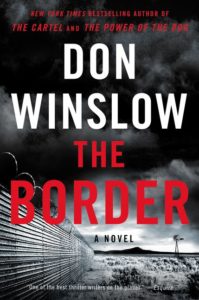 Don Winslow, The Border
Don Winslow, The Border
William Morrow, February 26
Winslow’s latest is one of the most hotly anticipated titles in recent years, the final in the three-volume Cartel series, which began in 2005 with The Power of the Dog, continued with The Cartel in 2015, and now concludes with The Border. Together, Winslow’s novels make up an epic crime fiction history of the modern War on Drugs, an achievement that rivals Ellroy’s history of the Los Angeles underworld and goes as far as any work of fiction can in explaining how we’ve reached the current quagmire: a region engulfed in violence, the spread of an opioid epidemic, the militarization of police forces across the Americas, and the rise of opportunistic political regimes eager to capitalize on the suffering. All that, and Winslow tells a hell of a compelling story. (DM)
 César Aira, tr. Chris Andrews, Birthday
César Aira, tr. Chris Andrews, Birthday
New Directions, February 28
Argentine author César Aira’s reputation precedes him. He has more than 100 books and stories under his belt, and Birthday adds to this oeuvre with a brief, humorous meditation about the author’s 50th birthday (he’ll be turning 70 when the book is published) and the way time and people pass us by. (AR)
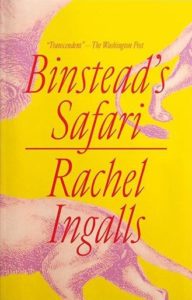 Rachel Ingalls, Binstead’s Safari
Rachel Ingalls, Binstead’s Safari
New Directions, February 28
If you haven’t already read Rachel Ingalls’ slim 1982 masterpiece, Mrs. Caliban (the story of a grieving suburban housewife who enters into a passionate affair with a soulful humanoid sea monster, reissued last year by New Directions), you’re missing out on one of the most eerily brilliant novels of the last fifty years. Happily, New Directions has gone back to the Ingalls well and is reissuing Binstead’s Safari—another sinister, feminist, magical realist gem about an underappreciated woman escaping the orbit of a shitty man. The quiet, subservient Millie Binstead accompanies her awful academic husband, Stan, on a research trip to Africa, but en route is transformed into a fierce, vivacious version of herself that Stan can no longer control. (DS)
 Claudio Magris, tr. Anne Milano Appel, Snapshots
Claudio Magris, tr. Anne Milano Appel, Snapshots
Yale, February 28
A flaneur and cosmopolitan in an era which often assumes these designations are dead, Claudio Magris has spent his life rethreading the line of European History through the present. So vitally it sometimes seems he has lived an extra lifetime. His masterpieces, the drowned novel Danubio and the linked collection Microcosms, opened the doorway to several of today’s best novelists, from Olga Tokarczuk and Aleksandar Hemon, from Jenny Erpenbeck to Rabih Alameddine. For the past fifteen years, as Magris has continued to produce his own peculiar brand of nonfiction novel, he has sketched visions from his cafe chair, at his apartment, from temples in India and inside mosques in Istanbul. “Snapshots” collects them and they read like the satori of a historian, walking out the wintry days of his life. He visits gravestones, conducts annual conversation with friends, perhaps for the last time. Falls in love with Trieste all over again. If Magris was a filter on instagram its hallmark would be an earned melancholy. Thank god he is not, though, for on every page here is a way of looking that restores mystery to the world. (JF)
MARCH
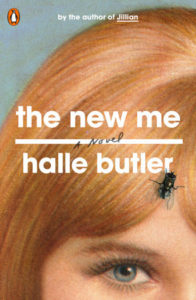 Halle Butler, The New Me
Halle Butler, The New Me
Penguin Books, March 5
Catherine Lacey described the second novel from Halle Butler—whose debut, Jillian, was a thrilling, hilarious, hostile affair—as “a dark comedy of female rage.” It stars Millie, who is just the kind of misanthropic, hopeful/doomed thirty-year-old we’ve all known, and/or been, and/or loved, and/or hated. Butler is an essential contemporary voice; can’t wait for this one. (ET)
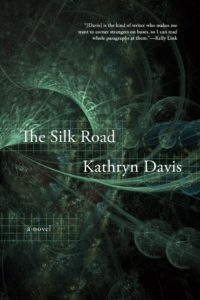 Kathryn Davis, The Silk Road
Kathryn Davis, The Silk Road
Graywolf, March 5
Kathryn Davis is one of our finest and strangest writers; her most recent novel may be her strangest—and at the very least her most allegorical—yet. It concerns eight siblings: the Astronomer, the Archivist, the Botanist, the Keeper, the Topologist, the Geographer, the Iceman, and the Cook, who are all, when the novel opens, taking a yoga class at the end of the world. When corpse pose, for one of them, becomes permanent, they all begin to muse on their childhoods, both shared and private. Eat your expectations for this one; you never know where Davis will take you. (ET)
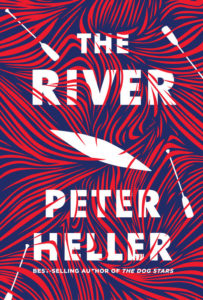 Peter Heller, The River
Peter Heller, The River
Knopf, March 5
Bestselling author of The Dog Stars Peter Heller’s latest is a literary thriller about friendship: two college friends decide to canoe down Canada’s Maskwa river. All well and good and relaxing, but then they overhear a man and a woman arguing, and when they later find the woman beaten nearly to death and make the mistake of radioing her husband, they find themselves on the run from a dangerous foe—which is not even counting the wildfire on their heels. (ET)
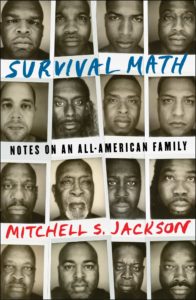 Mitchell S. Jackson, Survival Math: Notes on an All-American Family
Mitchell S. Jackson, Survival Math: Notes on an All-American Family
Scribner, March 5
Taking its title from the calculations the author and his family had to make to stay alive and safe every day, Survival Math—Whiting Award recipient Mitchell Jackson’s follow-up to his brilliant 2013 novel, The Residue Years—is a powerful, vital portrait of Jackson’s youth in a Portland neighborhood blighted by drugs, violence, and governmental neglect, as well as a thrilling and lyrical redemption memoir. (DS)
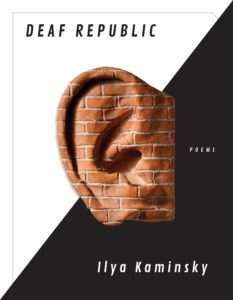 Ilya Kaminsky, Deaf Republic: Poems
Ilya Kaminsky, Deaf Republic: Poems
Graywolf, March 5
In the poetry world Kaminsky’s second book has been a wondered about second-act on par to Marilynne Robinson’s Gilead. Why? The Ukrainian-born Kaminsky is a kind of walking IMDB of poetry, libraries of the world’s verse and all their music live inside him. In part because since the age of 4 Kaminsky has been without a lot of his hearing. “Dancing in Odessa,” his 2004 debut, channeled this erudition into his own poetry, but in “Deaf Republic” Kaminsky truly emerges and its a glorious thing to behold. Poem by poem he turns lack of hearing into both metaphor and meaning. Using italics and short lines, unexpected stanza breaks and recurring images, Kaminsky evokes the sonic solitude of deafness: the way words exist inside his head more than outside of it. Alternating between love and poems and dirges, he also brings to life the state of siege a lot of the world has lived under in the past century and builds a poetic nation out of imagined dispatches. Where we when the bombs our taxes paid for fell? When the 4 am bunker busters woke the canaries in darkly-lit backyards. These poems ask us to please wake from our silence. (JF)
 John Lanchester, The Wall
John Lanchester, The Wall
W. W. Norton, March 5
John Lanchester’s debut, A Debt to Pleasure, is a pure, ecstatic delight, but he hasn’t gotten as much attention as he deserves, especially on this side of the pond. His latest book is a timely dystopian novel in which an island nation (could it be Britain, in the near future?) has surrounded itself with an enormous concrete wall—the National Coastal Defense Structure—to keep out the Others, who are trapped in the rising waters outside, and desperate to come in. If they do make it in, the Defender who allowed it will be cast off in their place, and the refugee pressed into slavery. This may be difficult reading in 2019, but I suspect it will be great reading. (ET)
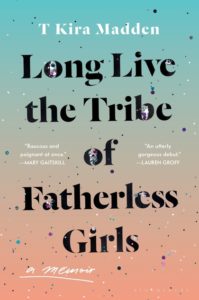 T Kira Madden, Long Live the Tribe of Fatherless Girls
T Kira Madden, Long Live the Tribe of Fatherless Girls
Bloomsbury, March 5
No Tokens editor-in-chief, teacher, and—as she notes in her author bio—amateur magician Madden’s first book is an affecting, clear-eyed memoir about her childhood as a queer, biracial daughter of loving but often drug-addicted parents in Boca Raton, and her journey towards self-knowledge and self-appreciation. You may have read the scintillating excerpt she published in Guernica. I assure you that the rest of the book does not disappoint. Man, can Madden write a sentence. (ET)
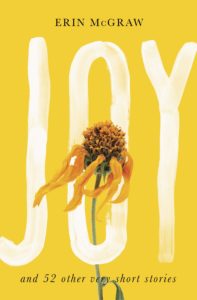 Erin McGraw, Joy: and 52 Other Very Short Stories
Erin McGraw, Joy: and 52 Other Very Short Stories
Counterpoint, March 5
There’s something immensely satisfying about a very short story (particularly one that bills itself as a “very short story” rather than “flash fiction”), and I’m looking forward to a whole collection of them. The stories’ narrators include “the impulsive first-time murderer, the depressed pet sitter, the assistant of Patsy Cline, the girlfriend of your husband,” and based on the other stories I’ve read of McGraw’s, I have high hopes for both humor and devastation. (JG)
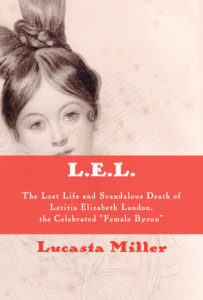 Lucasta Miller, L.E.L: The Lost Life and Scandalous Death of Letitia Elizabeth Landon, the Celebrated “Female Byron”
Lucasta Miller, L.E.L: The Lost Life and Scandalous Death of Letitia Elizabeth Landon, the Celebrated “Female Byron”
FSG, March 5
Letitia Elizabeth Landon was one of the most well-known writers of her time, publishing multiple volumes of poetry and several novels throughout the 1820s and 30s–many of which addressed while becoming a well-known figure in literary London circles. Miller’s heavily-researched book follows Landon through her literary ascent and to a mysterious end, offering a new, nuanced look at a legend. (CS)
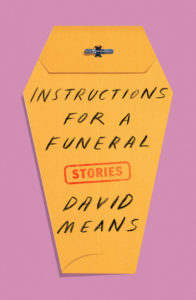 David Means, Instructions for a Funeral: Stories
David Means, Instructions for a Funeral: Stories
FSG, March 5
I’m a big fan of Means, and his short stories are the perfect vehicle to appreciate his perfect blend of violence and humor. (EF)
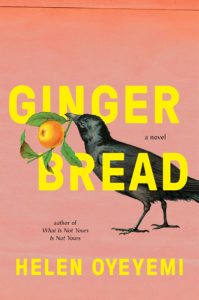 Helen Oyeyemi, Gingerbread
Helen Oyeyemi, Gingerbread
Riverhead, March 5
2019 already looks like a great reading year, not least of all because Helen Oyeyemi will be gracing the world with a new novel. Gingerbread looks set to bring more of her inventiveness and wit to a fairytale element—gingerbread, of course—that holds a mysterious place in children’s literature. The novel tells the story of Perdita and Harriet Lee, a daughter and mother who live in a gold-painted apartment with talking plants and make a kind of gingerbread that was extremely popular in Druhástrana, Harriet’s far-away (or imaginary, depending on who you ask), native land. I’m sold, as I’m sure all of Oyeyemi’s fans are as well. (MK)
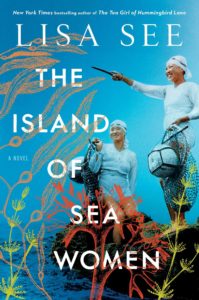 Lisa See, The Island of Sea Women
Lisa See, The Island of Sea Women
Scribner, March 5
The newest novel from the bestselling author of The Tea Girl of Hummingbird Lane is a compelling multigenerational saga, set on a small Korean island, home to a matriarchal society where the women work the sea, diving for food, and the men care for the children. But the core of the novel is the story of two best friends who come from very different families, and whose bond will be tested time and time again over the years. (ET)
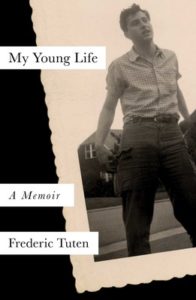 Frederic Tuten, My Young Life
Frederic Tuten, My Young Life
Simon & Schuster, March 5
From a squint, Frederic Tuten appears to have been born lucky. Teaching writing with Paul Bowles in Morocco. Rubbing shoulders with some of the great Latin American muralists of the mid-century. Co-writing the cult film, “Possession.” In the 1960s and 1970s his stories appeared in “The New Yorker” like miniature cataclysms of nerve. He hasn’t stopped, his most recent story won an O. Henry six decades into his life as a writer. Yet he came from somewhere and this exquisitely plain-spoken memoir recalls his childhood in the Bronx, the inevitable but still unlikely migration to Greenwich Village, and the way books and the people who wrote them well cracked open his world. Djuana Barnes, Malcolm Lowry. He tries and fails to become a painter, but he develops a talent for friendship and restlessness instead, and it shows in how he wears his developing self lightly, like a borrowed coat. He falls in love over and again and is crushed like a cigarette after each affair. Some people with big lives get that way through appetites; others by being intensely receptive to what’s possible. Tuten is the later kind of man, and in writing his early life he turns what could be an act of narcissism—speaking of himself—into one of sparkling generosity. (JF)
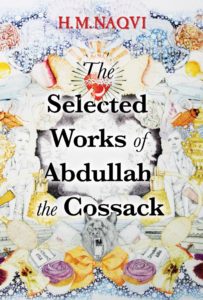 H. M. Naqvi, The Selected Works of Abdullah the Cossack
H. M. Naqvi, The Selected Works of Abdullah the Cossack
Black Cat, March 12
In the supernova of Pakistani talent that burst into view over the last two decades, from Mohsin Hamid and Kamila Shamsie to Nadeem Aslam and Daniyal Mueenuddin, H. M. Naqvi has always been an outlier who’d probably like to keep it that way. His 2009 DSC-prize winning Homeboy was a zooming, energetic counterpunch to so many perspectives of Pakistani’s post 9-11. The picaresque tale turns sour when its hero, Chuck, winds up jobless when the towers come down. It’s a lot harder for Chuck to maintain his bravado in bad times. Chuck’s voice was so vivid—one part Cheech and Chong, another part Ghostface Killah—it’s been hard to imagine where Naqvi would go next. The Selected Works of Abdullah the Cossack is the gorgeous, utterly original answer. In Karachi an aging bachelor son of a once-grand family inherits a ward. What follows is a family farce like no other, one where the vices of familial greed run up against an unexpected source of strength in a man who has dedicated his life to the cavalier arts: love. (JF)
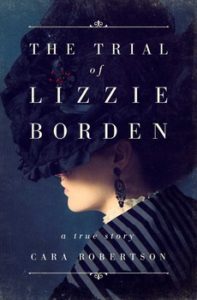 Cara Robertson, The Trial of Lizzie Borden
Cara Robertson, The Trial of Lizzie Borden
Simon & Schuster, March 12
You probably know the creepy children’s rhyme. Maybe you’ve also read the fictionalized accounts or seen the movies or even taken a tour of the house itself. If that’s the case, you probably want to check out this examination of the infamous murder trial and the rumors surrounding it. Piecing together courtroom transcripts, local newspaper accounts, and even letters from Lizzie Borden herself, Cara Robertson picks at this bit of American myth in a way that might satisfy your morbid curiosity. (KY)
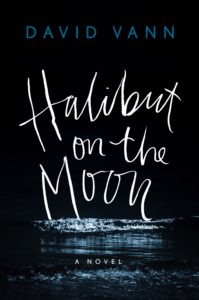 David Vann, Halibut on the Moon
David Vann, Halibut on the Moon
Grove Press, March 12
Halibut on the Moon is a story of one man’s journey home, mental illness, and the things that tether us to one another. With playful and disorienting language, David Vann has created a painful reimagining of the end of his own father’s life. (KY)
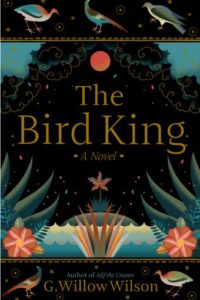 G. Willow Wilson, The Bird King
G. Willow Wilson, The Bird King
Grove, March 12
If you loved Wilson’s Alif the Unseen and have been wondering where she’s been since then, the answer is: writing for the excellent and necessary comic Ms. Marvel. And also, apparently, writing The Bird King, a fabulist novel set during the Spanish Inquisition, in which a young slave comes into her own. Thank goodness. (ET)
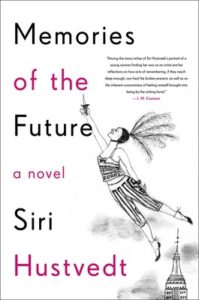 Siri Hustvedt, Memories of the Future
Siri Hustvedt, Memories of the Future
Simon & Schuster, March 19
I very much loved Siri Hustvedt’s last essay collection A Woman Looking at Men Looking at Women, and though it’s not quite right to call the widely honored and much loved author of 16 books “underrated” Hustvedt ought to pop up more often in our idle holiday conversations about “best living writers.” Though I came to Hustvedt through her nonfiction, I’m very much looking forward to Memories of the Future, an “elaborately structured, intellectually rigorous, urgently paced” novel of “memory, desire, and the imagination.” (JD)
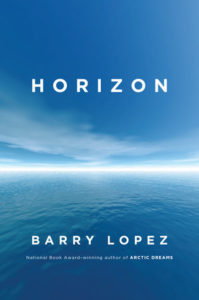 Barry Lopez, Horizon
Barry Lopez, Horizon
Knopf, March 19
Ever since he won the National Book Award in 1986 for Arctic Dreams, his transcendentally beautiful book about the arctic circle, landscape and imagination, Barry Lopez has been working on another book. It was always meant to grapple with the human capacity for violence, how journeying has so often married wonder with destruction, yet how necessary travel remains to fathoming the ways we are different. Thirty-some years and millions of miles later that book has at last arrived and none to soon. In our current state of environmental catastrophe, Lopez feels a bit like an American Virgil, one who can go above and below at the same time, leading us from sights of tremendous hope and peace, from the real to the dreamed. “Anthropologists and archaelogists I’ve asked speculate that in winter the Thule people slept for hours on end,” he writes from Skaerling in Greenland, before bedding down one night. “Conceivably these long slumbers opened up large dreamscapes, which might have functioned for them like the cycles of myths they listened to in difficult times from an isumataqor an angakkuq (shaman).” Lopez never puts himself in front of such forms of knowledge, or grades them against others: he simply brings them to us, and in so doing has managed to fashion his own kind of travel literature, one which doesn’t merely report from distant places, but enlarges by refusing to place a center to the world. In his pages, through his journeys, the center is always the horizon. By staring at it—alongside many other people from places a long ways from his own Oregon—Lopez shows us what we gain when we respect the enormity of what we don’t know, and also what we’d lose were we to erase nature’s ways of knowing. (JF)
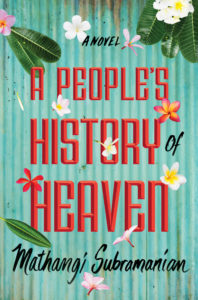 Mathangi Subramanian, A People’s History of Heaven
Mathangi Subramanian, A People’s History of Heaven
Algonquin, March 19
Heaven is a thirty-year-old slum in the growing city of Bangalore, and home to five best friends, a diverse group of girls who will band together to fight against the government who wants to wipe their home off the map and replace it with homes for rich people. (ET)
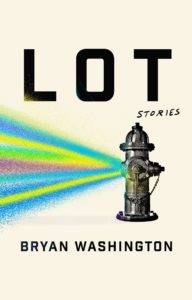 Bryan Washington, Lot
Bryan Washington, Lot
Riverhead, March 19, 2019
Author Bryan Washington, a Houston native, has written about the city extensively, turning his journalistic eye on the many stories it holds. In his debut collection, Washington keeps a narrative spotlight on Houston, exploring the lives that make up its many communities with captivating prose. (CS)
 Claudia Rankine, The White Card: A Play
Claudia Rankine, The White Card: A Play
Graywolf, March 19, 2019
From the author of the genre-bending cultural milestone Citizen: An American Lyric now comes a play about the urgency of recognizing systemic racial constructs. The White Card, which play made its world premiere earlier this year with the American Repertory Theater in Boston, questions the role of whiteness as the presupposed “norm” in our society and exposes what harms are wrought when whiteness is invisible. (CS)
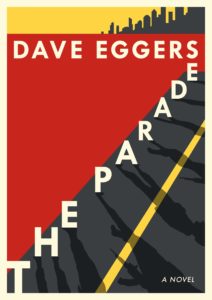 Dave Eggers, The Parade
Dave Eggers, The Parade
Knopf, March 19
The McSweeney’s founder, Dayton Literary Peace Prize-winner, and prolific author of A Heartbreaking Work of Staggering Genius, The Circle, and Heroes of the Frontier is back with another politically charged work; this time an intriguing-sounding allegorical novel about two foreign contractors sent to an unnamed, recently war-torn country to finish the armistice-commemorating highway designed to connect the opposing halves of the state. (DS)
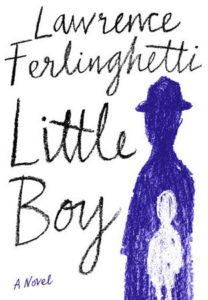 Lawrence Ferlinghetti, Little Boy
Lawrence Ferlinghetti, Little Boy
Doubleday, March 19
Publisher-poet Lawrence Ferlinghetti’s next book, due out less than a week before his 100th birthday, has been dubbed a “closing statement” on an almost impossibly fecund life, and an energetic take on what the near future might hold in store for the rest of us. Perhaps it’s odd that I’ve always found Ferlinghetti to be one of the most interesting figures associated with the Beat Generation—he was and continues to be a reticent cultural gatekeeper, an unassuming curator. Little Boy will be most interesting for its biographical reflections, I imagine, but I’d be lying if I said I wasn’t excited to see some fresh Ferlinghetti-an stylistic bursts. Punctuation be damned! (AR)
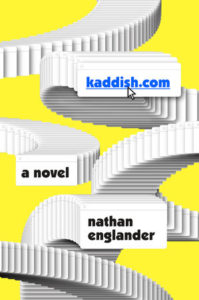 Nathan Englander, kaddish.com
Nathan Englander, kaddish.com
Knopf, March 26
I recently reread Englander’s short story collection What We Talk About When We Talk About Anne Frank, and was reminded of how skilled he is at creating moments of incredible truth, and at writing morality without moralizing. Englander is deft at quiet inner conflict, and this novel—about an atheist in a family of Orthodox Jews who attempts to outsource his mourning of his father—sounds like it plays to his considerable strengths. (JG)
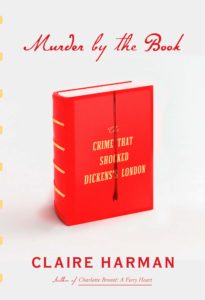 Claire Harman, Murder by the Book: the Crime that Shocked Dickens’s London
Claire Harman, Murder by the Book: the Crime that Shocked Dickens’s London
Knopf, March 26
What’s better than a literary work of true crime? A literary work of true crime about a literary crime, of course! Claire Harman understands how to weave a tale true to life so that it reads like a thriller, and this tale of murder by book in Victorian England promises not to disappoint. (MO)
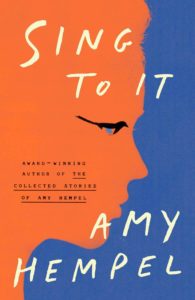 Amy Hempel, Sing to It: Stories
Amy Hempel, Sing to It: Stories
Scribner, March 26
Amy Hempel writes with so much poise and elegance it’s tempting to shove the word classic into a wall and stack her books on that high shelf. Who else has rendered the retraction of love’s blade in such simplicity? Which American writer has lived across so many different trends and continued to sound only like herself? Joy Williams? Toni Morrison? Deborah Eisenberg? The list is very short. In the wake of her Collected Poems, an appearance by Hempel in one journal or another has been like seeing a falling star on an otherwise busily lit universe. Always been worth it. If you don’t believe me, follow this link to the title story, which, in thirteen lines, tells you all you’ll ever need to know about love. Some of the other tales in “Sing to It” take a lighter approach to living, all of them are longer, but they never take their eye off on the scale of what it means to breathe in, then push air out in words, sometimes song. (JF)
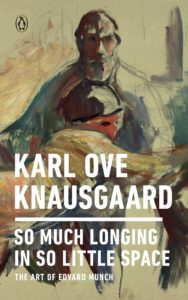 Karl Ove Knausgaard, tr. Ingvild Burkey, So Much Longing in So Little Space
Karl Ove Knausgaard, tr. Ingvild Burkey, So Much Longing in So Little Space
Penguin, March 26
The man has a compulsion—it’s the only way to explain this kind of literary output. Knausgaard’s latest work to be translated into English is ostensibly a study of the art of Edvard Munch, but of course is also a book about Knausgaard himself, and how it feels to consider Munch’s art, and even curate it, as he was asked to do for the Munch Museum. So it becomes a book about subject and author both, and should be interesting to any who enjoy the work of either. (ET)
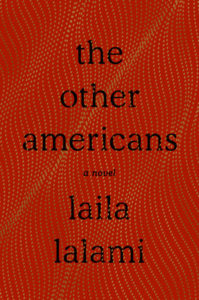 Laila Lalami, The Other Americans
Laila Lalami, The Other Americans
Pantheon, March 26
The follow-up to her widely-acclaimed 2015 novel The Moor’s Account, Laila Lalami’s The Other Americans centers on the death of Driss Guerraoui, a Moroccan immigrant in California who is killed one night after being struck by a speeding car. It’s a mystery story set between the old and the ostensibly new, the “old country” and the United States, where the answers to our most urgent questions are often not forthcoming. It’s all too easy, unfortunately, to note the similarities between Lalami’s premise and real-world instances of violence, from the death of Heather Heyer in Charlottesville to the murder of Idy Dienec, a Senegalese immigrant to Italy shot in Florence earlier this spring. (AR)
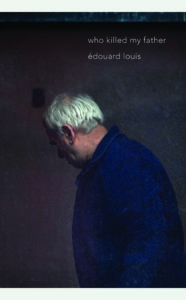 Édouard Louis, tr. Lorin Stein, Who Killed My Father?
Édouard Louis, tr. Lorin Stein, Who Killed My Father?
New Directions, March 26
Growing up in a village in the north of France, Edouard Louis lived under a code of masculinity neatly summarized by his own father. “[B]e a man, don’t act like a girl, don’t be a faggot.” Louis’ breathtakingly brilliant debut, “The End of Eddy,” told the cost of trying to live by that code while growing up gay. It also revealed what demons of contempt crept into his heart when he’d moved to Paris, gone to school, and rebuilt a self against its violence. Faced with the opportunity to look back on his upbringing with scorn, Louis instead chose a regretful, vulnerable kind of love. One of the most moving parts of that novel was the complex portrait Louis painted of his father, a laborer who worked his body into early retirement, who never saw a second self in the media, a working-class man intimidated to the point of fear by his son’s growing intellect. In this book Louis’s father takes center stage, and his is a brutal, heart-breaking tale. Louis effectively argues his fathers life is a case of economic homicide in slow-motion. First his father’s back is mangled at work, then under Sarkozy Louis’ father loses unemployment benefits which guide him into yet more menial work. Finally, under Macron, a measly five euros is taken from his benefit, while the rich are given enormous tax breaks. In the middle of our monstrous second gilded age, this book is a tour-de-force of political writing: another reminder that obscene profits always come from the bodies of the unseen. (JF)
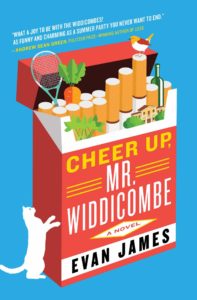 Evan James, Cheer Up, Mr. Widdicombe
Evan James, Cheer Up, Mr. Widdicombe
Simon & Schuster, March 26
I have heard Evan James read his work before, and I can’t think of a writer better equipped to write a contemporary comedy of manners. The novel is an over-the-top satire about a one summer in the life rich family, and though I find my appetite for the foibles of the hyper-wealthy somewhat dulled these days, I’m willing to bet James’ deft wit and generosity will make this one worth your while. (JG)
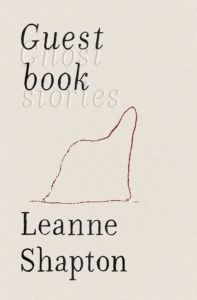 Leanne Shapton, Guestbook: Ghost Stories
Leanne Shapton, Guestbook: Ghost Stories
Riverhead, March 26
It’s fun to speculate about things we can’t explain. It’s fascinating to see what happens when we try to tell stories we don’t quite have words for. That’s why Leanne Shapton’s Guestbook—comprised of vignettes, photographs, and original paintings—is the perfect medium (get it?) for these ghost stories. (KY)
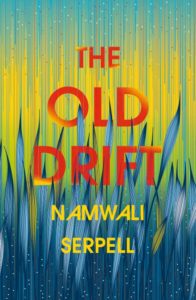 Namwali Serpell, The Old Drift
Namwali Serpell, The Old Drift
Hogarth, March 26
I first encountered the brilliant Namwali Serpell at the 2017 PEN World Voices Festival (on a panel that also featured Jeff VanderMeer, Marge Piercy, and Alice Sola Kim), and when I heard that her novel The Old Drift is coming out in 2019, I got excited before even hearing a thing about it. Now that I know more—it’s an epic, genre-bending tale narrated by a mysterious swarm-like (potentially evil!) chorus, telling the story of a small African nation called the Old Drift and the intertwined lives and conflicts of three Zambian families—The Old Drift‘s cemented its place on my must-read list. If you’re looking for a gripping novel that blends fairytale, romance, and science fiction, and isn’t set in the Western world, this might just be one of the most intriguing things you’ll read all year. (MK)
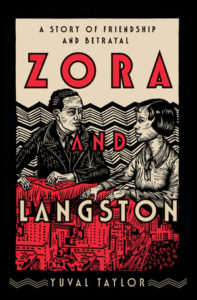 Yuval Taylor, Zora and Langston: A Story of Friendship and Betrayal
Yuval Taylor, Zora and Langston: A Story of Friendship and Betrayal
W. W. Norton, March 26
For those of us delighted by and endlessly interested in the stormy relationship between Zora Neale Hurston and Langston Hughes, two towering literary figures and leaders of the Harlem Renaissance, comes this volume, a detailed unpacking of their lives, loves, and grievances. Who doesn’t love a little literary gossip? Even decades old, it’s still good. (ET)
APRIL
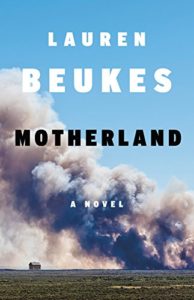 Lauren Beukes, Motherland
Lauren Beukes, Motherland
Mulholland, April 1
I’m always excited for a new novel from South African novelist Beukes, whose unique blend of science fiction, horror, noir, and literary fiction never fails to entertain. In her latest, a super-virus has wiped out almost all the men in the country, and a new society has been reformed in its wake—one that makes keeping a healthy man (or boy) secret a serious crime, and killing one the worst crime possible. Cole is guilty of both, and is on the run, trying to reach a place where her son might have a better life—but in order to get there, she must keep his identity hidden, and evade her violent ex as she goes. (ET)
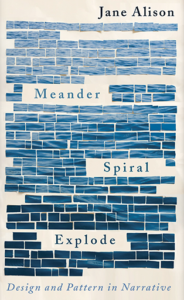 Jane Alison, Meander Spiral Explode
Jane Alison, Meander Spiral Explode
Catapult, April 2
In this craft book, Jane Alison essentially argues that the ubiquitous dramatic arc, the first story structure taught to young writers (and readers), is, well, a “bit masco-sexual, no?” Here, she focuses on other patterns for storytelling—waves, spirals, radials, networks, fractals—and draws on the work of writers like W. G. Sebald, Anne Carson, Marguerite Duras, Jamaica Kincaid, Clarice Lispector, and more to propose a less ejaculatory standard for literature. And I should say that having taken several classes with Alison, I know for sure that she’s the real deal: a brilliant, out-of-the-box reader and writer, whose craft advice we could all benefit from. (ET)
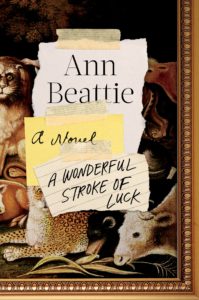 Ann Beattie, A Wonderful Stroke of Luck
Ann Beattie, A Wonderful Stroke of Luck
Viking, April 2
For those who are familiar with Beattie’s elegant, affecting work—and her many, many New Yorker stories—this is an easy sell, no matter what’s inside. But here’s what’s inside anyway: it’s starts at a boarding school (for “really bright kids who’ve screwed up”), and follows one of said kids to college and through a confused decade after—as people from his past keep popping up. Beattie’s knack for character development and subtle meaning-making should make this a showstopping read. (ET)
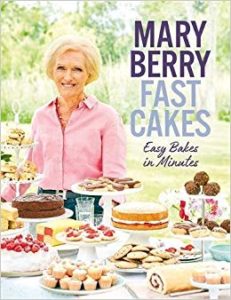 Mary Berry, Fast Cakes: Easy Bakes in Minutes
Mary Berry, Fast Cakes: Easy Bakes in Minutes
Quercus, April 2
I think it’s safe to say that all right-thinking people miss the spectacularly British, soggy bottom-intolerant lover of spirits that is Mary Berry. With all due respect to the woman who took her place on the Great British Baking Show (it’s not her fault she’s not Mary Berry), the show has been a close-textured shadow of its former self since Mary left. But now she’s back, in book form, with cakes that are fast! I have no doubt that they will be—to borrow a word—scrummy. (JG)
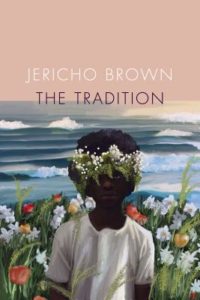 Jericho Brown, The Tradition
Jericho Brown, The Tradition
Copper Canyon, April 2
“Every poem in a love poem. Every poem is a political poem. So say the masters,” Jericho Brown, first book “PLEASE” won the American Book Award, wrote in an essay published in 2015. This spirit runs through Brown’s work, which now appears in a compelling new volume, The Tradition. (CS)
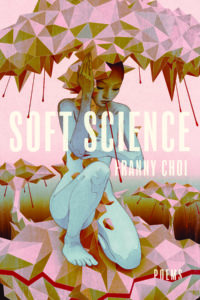 Franny Choi, Soft Science
Franny Choi, Soft Science
Alice James, April 2
It’s startling in an era of AI and constant surveillance how few poets of the body think about the way we operate like cyborgs. This has not slipped past Franny Choi. In Soft Science, her fantastic and eerie second book, a tribute to and dialogue with Donna Harway’s great manifesto, Choi plies a poetics of the fully exposed CPU, map-matching the body and its instructions against the internet and its imperatives. How are we being reprogrammed by what we touch? By what we film and then watch? It’s hard to say but poem by poem Choi causes you to wonder. Flashes of what read like experience sift like broken code into the hardware of this book. Tangled among the wires and rot of a body are conflicting messages: one says want, the other says provide. Resisting these as binaries, Choi turns out poems of the erotic that feel like interfaces and Turing-tested verse with the tentative intimacy of consciousness. Like Camille Rankine, Choi is a poet of steely nerve and intent, she’s way beyond doing this for kicks. “Soft Science” is her attempt to clobber the way we think of the body’s pre-sorted responses through sheer force of style. By juxtaposing the plastic with organic, she claims all the fallen world and achieves something new here, something rarely seen in poetry: profoundly intelligent work which makes you feel. Sometimes it’s disgust, sometimes it’s wonder: often both and more at the same time. Tiny blinking lights keep the pathway she walks toward this organic rebooting barely lit. It’s dark, but very worth following her. (JF)
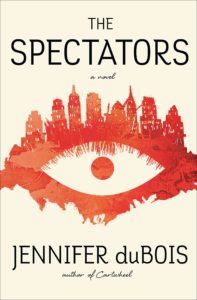 Jennifer duBois, The Spectators
Jennifer duBois, The Spectators
Random House, April 2
An enigmatic talk show host is thrust into a spotlight he definitely did not want when a group of teens responsible for a mass shooting claim to be his biggest fans—and the past he wishes would stay hidden begins to come back to the surface. Covering three decades of American culture, including the 90s pop culture wars and the AIDS crisis of the 80s to the liberated 70s, this may be duBois’ most ambitious work yet. (ET)
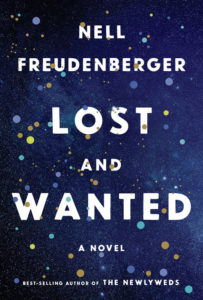 Nell Freudenberger, Lost and Wanted
Nell Freudenberger, Lost and Wanted
Knopf, April 2
In the best-selling, Whiting Award-winning Freudenberger’s third novel, a MIT professor and physicist begins receiving texts from her best friend—who recently died of lupus. Sold. (ET)
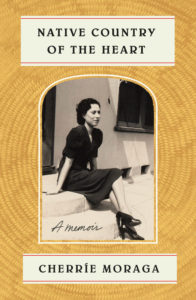 Cherríe Moraga, Native Country of the Heart: A Memoir
Cherríe Moraga, Native Country of the Heart: A Memoir
FSG, April 2
Cherríe Moraga, whose 1983 book Loving in the War Years became a cultural touchstone for its discussion of queerness, politics and race, tells the story of her relationship with her mother interwoven with a larger history of the Mexican American diaspora. (CS)
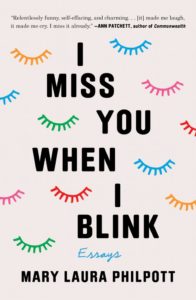 Mary Laura Philpott, I Miss You When I Blink
Mary Laura Philpott, I Miss You When I Blink
Atria, April 2
A funny and self-effacing memoir-in-essays from a bookseller who thought she had her whole life figured out (and had done everything right and gotten everything she wanted) only to wake up one day and realize that . . . she hadn’t. Relatable!
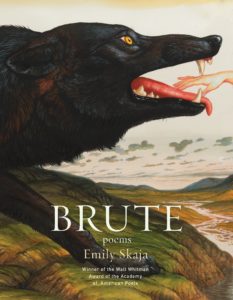 Emily Skaja, Brute: Poems
Emily Skaja, Brute: Poems
Graywolf, April 2, 2019
“Yes, I was wounded. / I found I had strung my life between two bad men,” writes Emily Skaja in her poem “Brute Force.” Skaja, the Poetry Co-Editor of Southern Indiana Review, writes boldy in her debut collection about sexuality, vulnerability, power, and self-discovery after loss. (CS)
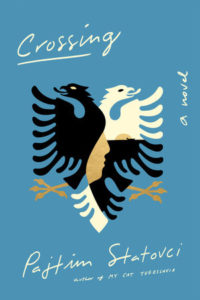 Pajtim Statovci, tr. David Hackston, Crossing
Pajtim Statovci, tr. David Hackston, Crossing
Pantheon, April 2
In Crossing, his second novel to appear in English, Finnish-Kosovan novelist Pajtim Statovci takes on issues of identity, gender, and sexuality and braids them into a rich history of Albanian myth and legend. Following Bujar, who decides to leave the ruins of Communist Albania with his fearless friend Agim and travel to Italy, Crossing explores their further struggles as they try to feel at home in a new country and in their own bodies. Crossing sounds contemporary and mythical all at once, and I can’t wait to read it. (MK)
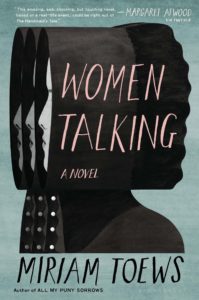 Miriam Toews, Women Talking
Miriam Toews, Women Talking
Bloomsbury, April 2
Toews novelizes the horrific drugging and sexual assault of 130 girls in an an ultraconservative Mennonite colony in Bolivia that occured between 2005 and 2009. Toews imagines eight of the women coming together to talk about what to do; one of the women says, “There’s no plot, we’re only women talking,” but there is a pull to the story that makes Women Talking one of the most exciting novels coming out this year. (EF)
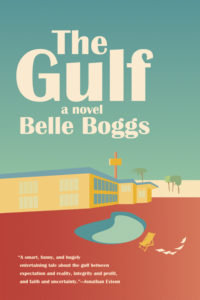 Belle Boggs, The Gulf
Belle Boggs, The Gulf
Graywolf, April 2
A bitingly satirical debut novel from Boggs, whose nonfiction exploration of fertility and motherhood, The Art of Waiting, made a splash back in 2016. The Gulf tells the story of a down on her luck Brooklyn writer who reluctantly accepts a job (from her novelist ex-fiancé and his venture capitalist brother) directing a low-residency school for Christian writers at a motel they’ve inherited on Florida’s Gulf Coast. (DS)
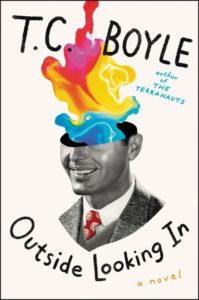 T. C. Boyle, Outside Looking In
T. C. Boyle, Outside Looking In
Ecco, April 2
The latest from the PEN/Faulkner Award-winning novelist and short story writer known for his lush, satiric prose and maximalist imagination explores the first scientific and recreational forays into LSD and its mind-altering possibilities. This 1960s-set novel focuses on a Harvard Ph.D. student and his wife who get drawn into the inner circle of renowned/notorious real-life American psychologist and psychedelic drugs advocate, Timothy Leary (who Richard Nixon once dubbed “the most dangerous man in America”). (DS)
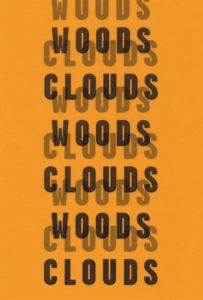 Michael Earl Craig, Woods and Clouds Interchangeable
Michael Earl Craig, Woods and Clouds Interchangeable
Wave Books, April 2
Wry, brilliant, but often silly, Craig is America’s reigning high plains absurdist. He has the broken syntax of profundity down cold, but he turns that tone inside out, forcing the reader to pay attention. This new book is full of mock portraits of famous figures of the past and gnomic dispatches from a poet’s life in Montana which he deadpans at the reader with just enough English on the delivery to never seem smug. These are companionable poems which sneak up on you. They stick to your mind like the best images and tilt with the dignity of prairie weathervanes. When Craig turns his bent vision on the grand absurdities—how we rest in a coffin, or speak of the nearly dead in past tense and the recently dead as if they’re here—he hasn’t exhausted our sympathies. (JF)
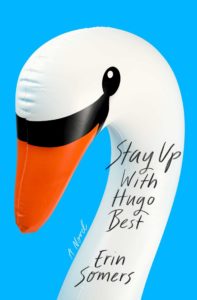 Erin Somers, Stay Up With Hugo Best
Erin Somers, Stay Up With Hugo Best
Scribner, April 2
Erin Somers’ funny, moving, razor-sharp debut novel tells the story of a broke, caustic, and newly unemployed twenty-nine-year-old writers’ assistant who is invited to spend Memorial Day weekend at the Greenwich mansion of her former boss and teenage crush (the titular Hugo Best-a legendary comedian and talk show host who survived a sex scandal with an underage girl a decade previous and has now been semi-forced into retirement). (DS)
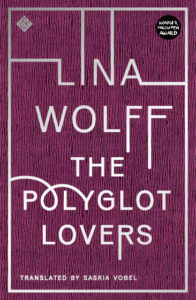 Lina Wolff, tr. Saskia Vogel, The Polyglot Lovers
Lina Wolff, tr. Saskia Vogel, The Polyglot Lovers
& Other Stories, April 2
This immensely clever new novel by Lina Wolff brings to life three characters caught up in high level sexual games, turned inside out by what they want, and how it feels not to get it. “I’ve always thought that when I finally find a man it will be someone who comes from the same place as me,” says Elinor, one of Wolff’s three protagonists. “Someone you can go out to a cabin with on a Friday, light a fire.” Then the rosiness pales from her imagined scenario. “I’ve always pictured Jonny with me there. But by the time I met Ruben, Jonny had in fact been married for years and was living on a farm outside the village with a wife who’d had work done in her lips, breasts and genitals after giving birth to three children.” (49) Elinor’s voice alone could sustain this novel, but Wolff has instead painted a riveting triptych that grows in power through the comparisons and overlaps its multiple characters make possible. Beginning with Elinor, the book moves on to Max, who’s in search of a lover who can adore him in many languages, and finishes with Lucrezia, the grand-daughter of a marchesa in southern Italy. Winner of the prestigious August Prize in Sweden, Wolff’s biggest book yet is finally, a mad-cap feminist entertainment that ties all three together through a manuscript that floats through their lives, reengineering the assumptions of romance in the process. With luck this could be the 21st century’s “Possession.” (JF)
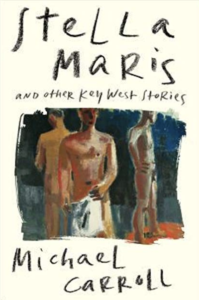 Michael Carroll, Stella Maris and Other Key West Stories
Michael Carroll, Stella Maris and Other Key West Stories
Turtle Point Press, April 9
There’s an end of banquet feel to Michael Carroll’s second collection, the celebration at an all inclusive nude gay resort in the Keys so sozzled the mournfulness rivering beneath the booze is way far down, lodged in a private socket that characters don’t often expose for pity. In the virtuosic opener an older man finds his way on the pecking order of younger beauties pairing off for public sex, and in another a man takes care of his dying friend, who managed to stay healthy long enough he could die of a neurological disease. Death is a unifier here, the last party everyone goes to. One of the best social observers in American fiction, Carroll proves the funeral party scene’s right behind the dinner party scene in fictional possibility when wound tightly. In the 90s, Andrew Holleran published some wonderful, grief-drenched stories about the Pines when that area was decimated by AIDS. These tales, set against the sherbety sunsets of the Keys, feel like a southern follow up, twenty years later: brightly lit and hilarious and deeply sad. (JF)
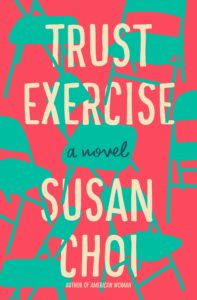 Susan Choi, Trust Exercise
Susan Choi, Trust Exercise
Henry Holt, April 9
To describe this book too much would be to give it away, but let’s just say that it begins with a fraught teenage love affair in an elite performing arts high school presided over by a charismatic teacher—and about halfway through there is a formal conceit that shifts the narrative, and then shifts it again, in a way I have never quite seen done before. Compulsively readable and formally brilliant: this is basically a literary unicorn. (ET)
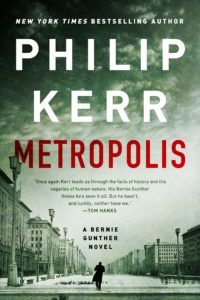 Philip Kerr, Metropolis
Philip Kerr, Metropolis
Putnam, April 9
The release of Philip Kerr’s last Bernie Gunther novel is bittersweet, given the author’s untimely death in early 2018. The use of the word “Metropolis” is a clue that this book takes place in Bernie Gunther’s early days of solving crimes in the anything-goes 1920s, and while we’re still grieving the loss of a great writer, we’re pleased to know the series will wrap up with a visit to the world that first made Bernie Gunther what he is. (MO)
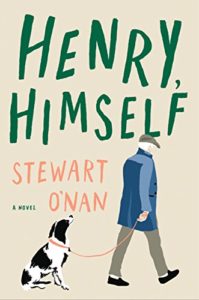 Stewart O’Nan, Henry Himself
Stewart O’Nan, Henry Himself
Viking, April 9
A companion book (and prequel) to O’Nan’s Emily, Alone (2011), Henry Himself is a portrait of Emily’s husband Henry—and if his story is anything like his wife’s, it will be a clear-eyed, moving, and subtly funny affair. (ET)
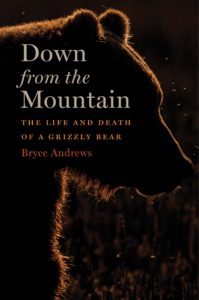 Bryce Andrews, Down From the Mountain
Bryce Andrews, Down From the Mountain
Houghton Mifflin Harcourt, April 16
Would that we had more nature writing like Byrce Andrew’s fantastic second book, Down from the Mountain. Part biography of the Mission Valley in Montana, informed by the Blackfeet and Salish histories rooted there, it tells a moving modern tale of how ranchers and big predators overlap uneasily on that land today. The book’s key protagonist is Millie, a 500-pound grizzly who hibernates up in the mountains, its flora and fauna no different there than it was 10,000 years ago. Every spring and summer she comes down to the corn fields to feed in the summer. Standing three feet high at the shoulder, taller than a human can reach on her hind-legs, she and grizzlies like her shuck and nibble corn with a delicacy that could get them a seat at your grandmother’s table. Yet not everyone would delight in such company. Down from the Mountain eschews easy moral scrimmaging, though, and as it tells Millie’s story and that of her cubs, it turns into a subtle and beautifully unexpected book. Some farmers don’t hold the bears ill-will, and more than a few people distrust human civilization and yearn for the wild. When not writing, Andrews works with a Bozeman organization attempting to sort out how to make it possible for the animals and humans to have equal purchase on the land. “Down from the Mountain” ought to make their work a little easier. Readers hungry for yet another torch bearer to the ways of thinking of the wild that Barry Lopez and Leslie Marmon Silko made possible should look no further. (JF)
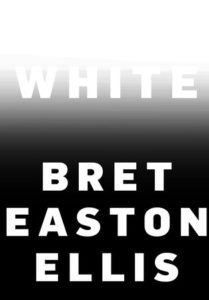 Bret Easton Ellis, White
Bret Easton Ellis, White
Knopf, April 16
Bret Easton Ellis hasn’t made too many friends in the literary world in the last few years, and he has even been known to enjoy trolling it—plus, he uses the term “snowflake,” so you can count me as being suspicious of his first work of nonfiction, which his publisher describes as “an incendiary polemic about this young century’s failings, e-driven and otherwise, and at once an example, definition, and defense of what “freedom of speech” truly means.” Yikes. At least I’m not alone. But still, it’s worth anticipating—even if it turns out to only be for the hate reads. (ET)
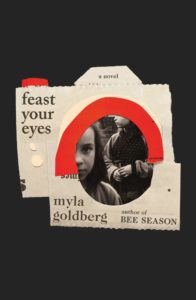 Myla Goldberg, Feast Your Eyes
Myla Goldberg, Feast Your Eyes
Scribner, April 16
The first novel in almost a decade from the bestselling author of Bee Season, presented as the catalogue notes from an exhibit at the MoMa and telling the story of Lillian Preston, “America’s Worst Mother, America’s Bravest Mother, America’s Worst Photographer, or America’s Greatest Photographer, depending on who was talking.” A mother-daughter story, an art-monster story, and an exciting structural gambit. (ET)
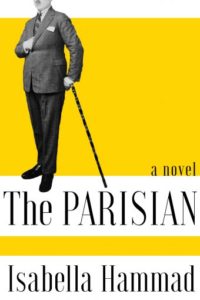 Isabella Hammad, The Parisian
Isabella Hammad, The Parisian
Grove Press, April 9
This rich historical novel by Paris Review Plimpton Prize-winner Isabella Hammad takes us back to another time of cataclysmic change. Unfolding between 1914, when the Ottoman Empire was beginning to collapse and with it a cosmopolitan Middle East, and the build up to World War II, it presents a sweeping portrait of Palestinian man caught amidst the macro-aggressions of the interwar years—as well as the raptures and ruptures of love.
As it begins Midhat Kamal has just arrived in Montpelier from Nablus to study with a renowned doctor. The old man’s daughter, Jeanette, is a warm but confusing figure for Midhat, so used he is to projecting ideas upon women he learned from the lyrics of Abu Nawas. There might be dust on his shoes but Kamal is fabulously educated and worldly in the way the increasingly powerful West is unable to fathom. This position, reinforced by tiny darts of dinner party poison—he’s chummily referred to by one boar as “the famous Oriental guest”—reinforce the outsiderness he’d discovered as a young man, a position that ultimately propels him to Paris. Hammad gorgeously guides this watchful and thoughtful consciousness through the years and into a shattering love affair, putting on a clinic of free indirect style. Roving into several other characters, some of them the types that made Edward Said’s great book so necessary, she captures the ripples of history as they’re intimately felt, and nastily nurtured. (JF)
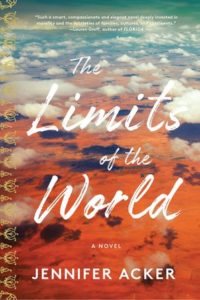 Jennifer Acker, The Limits of the World
Jennifer Acker, The Limits of the World
Delphinium, April 16
This intricately woven family saga about four generations of East African Gujarartis calls to mind the early work of Jhumpa Lahiri. Narrated in solemn tones but strung with moments of startling beauty, it chronicles its characters’ migration as a series of losses—in their case, of reference points. The Chandarias first came to Kenya from India for work and in brief, evocative passages the family’s aging patriarch describes the shocking conditions they discovered upon arrival. How hard it was to judge a situation so utterly foreign. Friends being eaten by lions at night on the farms where they worked. Leaping forward a century, in the year 2000, this man’s grand-daughter lives in Columbus, Ohio, and works hard to run a profitable store selling Authentic African Goods out of a mall storefront. Her husband, a doctor, wishes she’d stop this nonsense, convinced his wife’s brother back in Nairobi is stealing from the business. Meanwhile, their 30 year-old-son is many years into graduate study at Harvard and doesn’t seem any closer to a degree. Their worry falls hard on Sunil, who has spent so much time studying moral philosophy he’s not sure anything means anything any more—except his Jewish-American wife. Their marriage a happy decision he stumbles into just as years before his parents agreed to their all-but-arranged marriage. Acker has until now been best known as the founder and editor of the phenomenally astute and globally-tuned journal The Common. The Limits of the World should change that. This book weaves a sweeping mosaic of immigration and family-making, showing how movement can keep a family alive, but also sow the seeds of division and judgement and misunderstanding which can tear it apart. (JF)
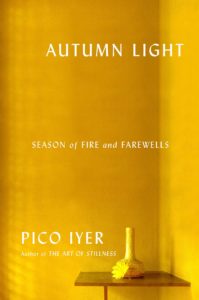 Pico Iyer, Autumn Light: Season of Fire and Farewells
Pico Iyer, Autumn Light: Season of Fire and Farewells
Knopf, April 16
“I long to be in Japan in the autumn,” writes Pico Iyer at the opening of his moving new memoir. Here’s a book about going for sorrowful reasons. As we begin, Iyer’s wife’s father has died and they need to come home to look after Hiroko’s elderly mother. Iyer’s life as a travel writer and reporter has until this point been one of freedom. As an Indian raised in Oxford whose parents called Santa Barbara home, a lucid writer with endless curiosity, and a secularist with a searcher’s heart, Iyer was Time’s go to guy to explore the increasing hybridization of global culture. Ever since Video Nights in Kathmandu, where he wrote on the effect of the video cassette on bringing East and West together, he’s been way out ahead of most commentators seeing how people actually live. So many phrases leap from his essays, from the “empire strikes back,” his take on the wave of writers from Rushdie to Ishiguro who rewrote the story of colonization, to the global soul. Iyer may be one of four people to have interviewed both Peter Matthiessen and the Dalai Lama and not been frightened of either. Staying clued in came at a cost, though.
For a time Iyer logged a quarter of a million miles a year on planes. Aside from the horrific environmental damage that kind of travel wreaks, he missed out on parts of life too. In fact, his last book—The Art of Stillness, which grew out of his fantastic TED talk—was an attempt to recalibrate our sense of movement in an age when travel, even for leisure, may not be feasible. Autumn Light is an extension of that project but it has an edge: this is a book about staying put because one has to, and about giving up things because age has drawn time to a point. Has any travel writer ever written this book? In choosing to exchange life as a perpetual visitor for that of a resident in Japan, Iyer finds a hopeful-making amount of freedom in living in – not just borrowing – daily rituals. Grabbing the post, making dinner, inquiring after and keeping up with neighbors. This is also a tremendously wise book on the late fires of marriage, how moving toward old age, if you’re lucky, as he is, a burst of warmth emerges to push you forward into the final step, the journey no one’s been able to write about.
(JF)
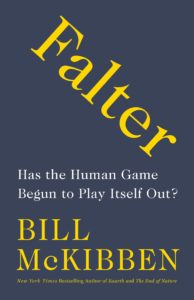 Bill McKibben, Falter: Has the Human Game Begun to Play Itself Out?
Bill McKibben, Falter: Has the Human Game Begun to Play Itself Out?
Henry Holt, April 16
Bill, Bill, I know, I know! The answer is… yes? Nonetheless we will still read your no doubt erudite, elegiac, slightly longer answer. (Crosses fingers in hopes of super-secret surprise happy ending.) (JD)
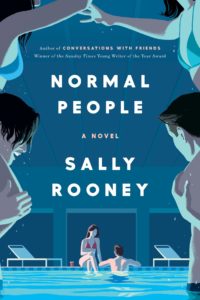 Sally Rooney, Normal People
Sally Rooney, Normal People
Hogarth, April 16
Nothing makes the Literary Hub office shriek more collectively and thoroughly than a Sally Rooney galley. Normal People, which tracks the lives of two high school sometime-lovers, is extremely smart, deeply pleasurable reading, even more so than Conversations with Friends. I could tell you some things about how she plays with time, or wax poetic about her immersive language and engrossing storytelling, but if you’re reading this list, it’s probably already your #1 2019 pick, so all I will tell you is: your rankings are correct. (ET)
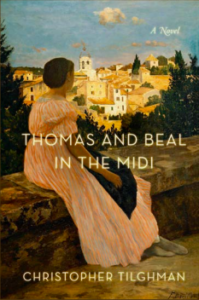 Christopher Tilghman, Thomas and Beal in the Midi
Christopher Tilghman, Thomas and Beal in the Midi
FSG, April 16
The third installment in Tilghman’s acclaimed historical fiction series that began with Mason’s Retreat in 1995 and The Right Hand Shore in 2012 moves back in time yet again to tell the story of a young interracial couple, Thomas and Beal Bayly, who run away to Paris in 1892 to begin a new life—first in the Latin Quarter, and then as winemakers in Languedoc. (ET)
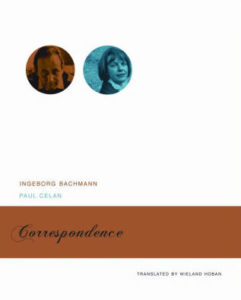 Ingeborg Bachmann, Paul Celan, tr. Wieland Hoban, Correspondence
Ingeborg Bachmann, Paul Celan, tr. Wieland Hoban, Correspondence
Seagull Books, April 19
Swiss-Italian author Fleur Jaeggy’s I Am the Brother of XX (New Directions, 2017) brought my attention to her dear friend Ingeborg Bachmann, one of post-WWII Germany’s great novelists, poets and playwrights, who died at age 47 after a fire in her apartment in Rome. The poet Paul Celan, Bachmann’s one-time lover, was born to a German-speaking Jewish family. While he was forced to work in a labor camp for almost two years during the war, his parents were deported to a concentration camp. Correspondence collects the passionate letters Celan and Bachmann exchanged in the wake of the Holocaust, between 1948 and 1961, giving us a look into a key moment in the history of 20th-century German literature. (AR)
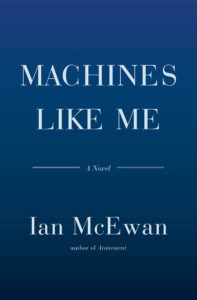 Ian McEwan, Machines Like Me
Ian McEwan, Machines Like Me
Nan A. Talese, April 23
A new Ian McEwan novel is always an event—though I don’t know about that last one, which if you remember was a reimagination of Hamlet from the perspective of a fetus. His latest is set in an alternative version of 1980s London and centers on a love triangle that includes a “synthetic human.” Should be fun. (ET)
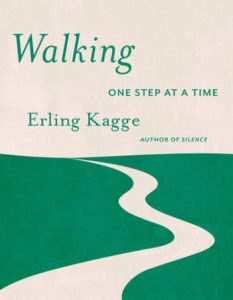 Erling Kagge, tr. Becky L. Crook, Walking
Erling Kagge, tr. Becky L. Crook, Walking
Pantheon, April 23
A lyrical account of our most basic form of transportation from Norwegian writer Kagge, author of Silence. (ET)
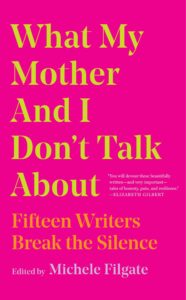 Michele Filgate, ed., What My Mother and I Don’t Talk About
Michele Filgate, ed., What My Mother and I Don’t Talk About
Simon & Schuster, April 30
A collection of fifteen essays from great writers—like Alexander Chee, Melissa Febos, Carmen Maria Machado, André Aciman, Brandon Taylor, and Leslie Jamison—on what we don’t talk about with our mothers, those women who are supposed to know us best. (ET)
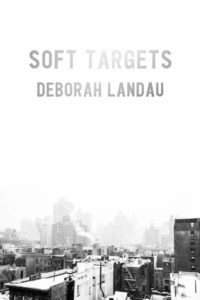 Deborah Landau, Soft Targets
Deborah Landau, Soft Targets
Copper Canyon, April 30
Deborah Landau has spent her life as a poet articulating a poetics of the body. Finding ways that a lyric can enter the space between what the body knows and what the mind wants. This cool as smoked ice new book deals with how that division collapses in a state of fear. Be it as a citizen on a crowded crosstown bus, traveling in an age of soft targets, or as a mother growing into the middle age awareness of how vulnerable a strong body can be. As a woman drinking alone. Fear is the connector and the current in Landau’s poems, where outer and inner become an endless loop. Written partly in Paris in the wake of the extremely violent terrorist attacks of 2015 and 2016, these poems are also dispatches from a ragged end of our present imperium, when violence often relegated to its outer edges bites back at its very center. How is space rearranged? What is centered? Is there a way to use language to love when it has become, essentially, weaponized? As Ginsberg wrote in Wichita Sutra Vortex, “all our language is taxed by war.” Terse and yet lyrical, floating in white space on the page like stark, intimate thoughts, Soft Targets is a riveting example of how we cannot take the body out of thinking, and we shouldn’t. (JF)
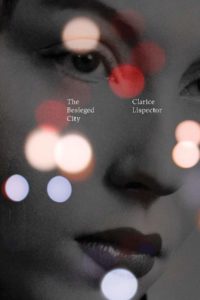 Clarice Lispector, tr. Johnny Lorenz, The Besieged City
Clarice Lispector, tr. Johnny Lorenz, The Besieged City
New Directions, April 30
“Lucrecia Neves would never be beautiful,” writes Lispector of the heroine of her 1948 novel, newly retranslated by Johnny Lorenz. “She had however a surplus of beauty that didn’t exist in pretty people.” If your mental eye did a double take on that description then you’ve already tipped forward into the orbit of this peculiarly enthralling book. A novel very much about surfaces and looking and the way a certain mindless life would lead to a blending of person and object. Lispector wrote it in 1948 while living in Switzerland and watching her carve a modernist novel out of sheer boredom is, on a craft level, dazzling. Stripped of introspection, her prose skitters from one place to the next, following her character about town, darting into others’ heads momentarily. The book is notable for its so-called happy ending, a marriage. In fact what’s so mesmerizing is how Lispector turns reality into something commodified and empty, yet plasticly beautiful, full of arresting creases back into life. “Such reality, the girl was seeing. Each thing. She twisted her head as a way of looking. Each thing. But suddenly, in the silence of the sun, a team of horses ran out from a corner. For a moment they froze with raised hooves. Sparkling at their mouths.” (JF)
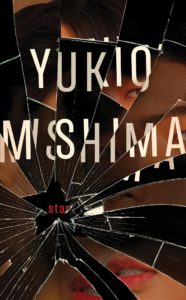 Yukio Mishima, tr. Sam Bett, Star
Yukio Mishima, tr. Sam Bett, Star
New Directions, April 30
Back in college, as an irritatingly broody windbag, “but have you read Mishima?” was my go-to pose of faux erudition. But guess what? I really, truly loved the slow twilight moods and intricately woven strands of anxiety and melancholy that seemed to loosely bind Mishima’s classic tetralogy, The Sea of Fertility. Insofar as I still love the aforementioned themes, I’m pretty excited for this first-ever translation of Star, by Sam Bett. (JD)
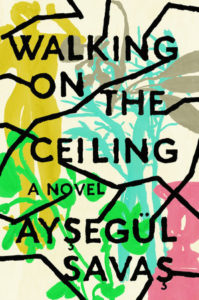 Aysegül Savas, Walking on the Ceiling
Aysegül Savas, Walking on the Ceiling
Riverhead, April 30
In this promising debut, a young Turkish woman named Nunu moves to Paris, where by chance, she meets an older, British writer of novels about Istanbul whom we know only as M. The two begin to walk around Paris, talking, as Nunu begins to reveal (and discover) more and more about her past, her country, and her self. Quiet, intense, and moving. (ET)
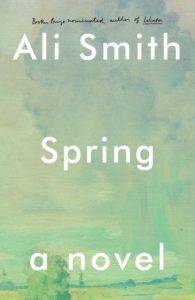 Ali Smith, Spring
Ali Smith, Spring
Pantheon, April 30
I love Ali Smith, and if you love Ali Smith too, you’ve probably read the first two books in her acclaimed seasonal quartet, Fall and (you guessed it) Winter. Stay tuned for Spring, the penultimate book in this series of interconnected stories. (KY)
MAY
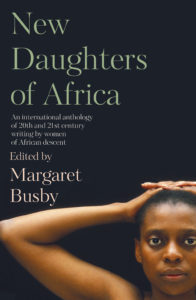 Margaret Busby, ed., New Daughters of Africa
Margaret Busby, ed., New Daughters of Africa
Amistad, May 7
Busby’s 1992 anthology curated a wave of cresting talent of the African diaspora, from Toni Cade Bambara and Maryse Conde and Dionne Brand to the already well known June Jordan and Ama Ata Aidoo. Twenty-five years later that wave has become a flood and this new volume showcases just how varied and geographically disparate the range of women writers with roots in Africa is today. And how many of these women are essentially transnational, from the British-Somali writer Nadifa Mohamed to the essayist and novelist Taiye Selasi, born of Nigerian and Ghanaian parents, raised in London and America, living today in Portugal. Featuring Aminatta Forna, Zadie Smith, Chimamanda Ngozi Adichie, Andrea Levy and more, this book will be a cause for celebration and ought to be a textbook for years to come. (JF)
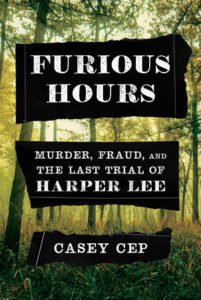 Casey Cep, Furious Hours: Murder, Fraud, and the Last Trial of Harper Lee
Casey Cep, Furious Hours: Murder, Fraud, and the Last Trial of Harper Lee
Knopf, May 7
Did you know that after publishing To Kill a Mockingbird, Harper Lee spent a year reporting and researching for a true crime novel (yes, a la In Cold Blood) about an Alabama serial killer? Me neither, but Cep did, and this book tells the whole story—and gives a window into the life and obsession of one of America’s most beloved and mysterious writers. (ET)
 Ani DiFranco, No Walls and the Recurring Dream
Ani DiFranco, No Walls and the Recurring Dream
Viking, May 7
This is a memoir from Ani DiFranco. If this book is meant for you, you are already screaming right now. If not, it’s fine. You can’t go back. Just keep scrolling. (DM)
 Aleksandar Hemon, My Parents/This Does Not Belong to You
Aleksandar Hemon, My Parents/This Does Not Belong to You
MCD x FSG Originals, May 7
With his departure of Chicago for Princeton, it feels like the re-narrativization of Aleksandar Hemon’s self has come to the end of one vivid orbit. These two extraordinary books form the comet tail of that circuit. On one hand My Parents chronicles the lives and histories of his beloved parents, their flight from Sarajevo and reconstruction of a home in Canada. It showcases Hemon’s great gift for carrying other people’s stories. On the other hand This Doesn’t Belong to You returns to the city of Hemon’s youth and beautifully depicts the awakening of his consciousness in language. These pieces, which cycle back to when the MacArthur winner was eight years old, are strange, dark lyrics to the feral qualities of childhood, some of them closer to poetry than prose. They feature some of his most shatteringly beautiful sentences yet. Together these two books present a powerful portrait of the forces which make us: the language we learn, which allows us to catch time in our hands; and the stories we inherit and witness, which teach us the stakes. Here is how memory’s mosaic, born out of love, becomes something almost holy. (JF)
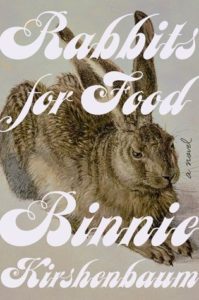 Binnie Kirshenbaum, Rabbits for Food
Binnie Kirshenbaum, Rabbits for Food
Soho Press, May 7
If 2018 has prepared me for anything, it’s how to enjoy a novel about a nervous breakdown. During the forced reverie of New Year’s Eve, Kirshenbaum’s clinically depressed writer protagonist completely unravels and ends up in a psych ward. Instead of accepting treatment, she writes her way through the experience and her grief, and I could not be more excited for Kirshenbaum’s first novel in ten years (EF)
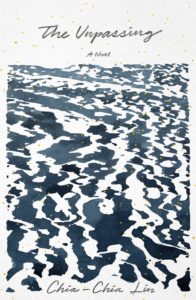 Chia-Chia Lin, The Unpassing
Chia-Chia Lin, The Unpassing
FSG, May 7
Chia-Chia Lin’s debut novel paints a devastating portrait of a family waking up from the American dream. This hard-working immigrant family from Taiwan struggles to make ends meet in Anchorage. Tragedy strikes when the children are infected with meningitis—and one of them doesn’t survive. The Unpassing is a moving story about grief, guilt, growing apart, and finding home. (KY)
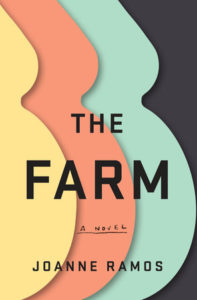 Joanne Ramos, The Farm
Joanne Ramos, The Farm
Random House, May 7
Imagine the most luxurious Hudson Valley retreat: organic food, daily massages, personal trainers, beautiful sights, and all for free. Actually they pay you—if you submit to their rules, do not leave the premises, and leave after nine months having produced a perfect baby. Of course our heroine is a woman who wants to break all the rules—Jane, fearing for her child, is desperate to leave The Farm, but terrified of what will happen if she does. A chilling and all-too plausible vision of the future. (ET)
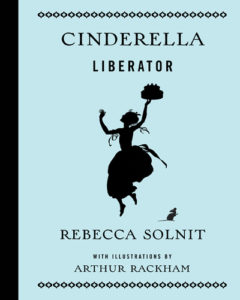 Rebecca Solnit, ill. Arthur Rackham, Cinderella Liberator
Rebecca Solnit, ill. Arthur Rackham, Cinderella Liberator
Haymarket, May 7
Rebecca Solnit is so good at demolishing broken narratives we tend to forget she’s equally skilled at raising new ones from their rubble. Essay by essay, as she’s done this in pieces about women, landscape, community action and the West, she’s enlarged the possibilities of what wasn’t working to begin with—often using genres we don’t typically associate as being in the wheelhouse of a political essayist. In one essay for this site, for example, she used the tones of a fairy tale to tell of Trump’s isolation; in another, riffing on a species of masculinity unwilling to change, she drew on the syntax of biological studies. So here comes Solnit in the open court with the yarn of Cinderella. What do you think she would do once she got the classic folk tale in her hands? It would have been so easy to make this a new story of revenge. Solnit’s version turns out to be a parable of intergenerational power sharing. Her Cinderella indeed is poor and also has a wicked stepmother. Like the Grimm’s edition, she’s also rescued by a fairy godmother, and loses a shoe. Upon coming home, though, Solnit’s heroine can’t help but marvel at the fairy godmother’s power. You turned mice into horses and a rat into a footman, she asks, what else or who else can we liberate? And off they go taking this miraculous wand and turning it to good, even freeing up the prince, who never really wanted to be a prince after-all. This is an inspired take on this time-worn tale. Someone smart will turn Solnit’s new version into a blockbuster film and Liberator will forever after be attached to the little girl’s name, not Disney. (JF)
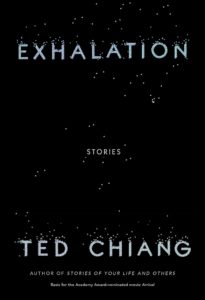 Ted Chiang, Exhalation: Stories
Ted Chiang, Exhalation: Stories
Knopf, May 8
Early in May there’s a high likelihood a book of short stories will shoot up onto the New York Times bestseller list. And unless you’ve been an avid reader of the journals “Subterranean online” and “e-flux,” or happened to catch the Best American Short Stories edited by Junot Díaz, chances are the name Ted Chiang will be new to you. After Exhalation it probably won’t be. Seventeen years after the publication of his debut collection, Chiang is back with and it’s clear he’s now the Alice Munro of science fiction. These nine long stories run the gamut in scenarios from a world where everyone is lifelogging to a heartbreaking tale of software developers trying to rescue digital animals from increasingly utilitarian corporate greed. What they share is a profound concern with the impact of a technology on civilization and the way culture and belief collide depending on where we grow up. Chiang is a master of different modes of fiction. One story begins in Baghdad in the long ago past where a gate allows travelers to glimpse their future selves. An air-driven mechanical being narrates the title story, and it concludes at an odd destination for science fiction in our age: hopefulness. “It cheers me to imagine that the air that once powered me could power others,” it says. Chances are these tales will project readers straight back to Chiang’s first collection for more mind-expanding work. (JF)
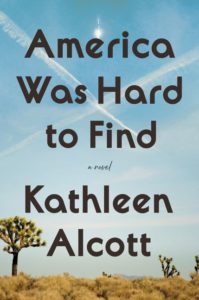 Kathleen Alcott, America Was Hard to Find
Kathleen Alcott, America Was Hard to Find
Ecco, May 14
I love intricate alternate histories, and I especially love them when they’re penned by authors with that rare ability to combine vivid, dazzling prose with sensitive and nuanced character building. Kathleen Alcott is one of those writers, and that’s why I’m especially excited to read her new novel, America Was Hard to Find—a reimagining of the Cold War era focusing on an activist and an astronaut who, after a short-lived affair, go their separate ways and become heroes to different sides of the political spectrum of 1970s America. (DS)
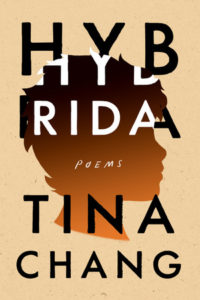 Hybrida, Tina Chang
Hybrida, Tina Chang
W. W. Norton, May 14
Tina Chang’s third collection moves like a tour-de-force of fury and love. Further proof that poetry’s power to negotiate polarized space explains why it’s so potent now. At the hub of Chang’s project lies a robust reclamation of motherhood as a hybrid form. To do this she deploys multiple poetic modes, from the zuhitsu to ghazals, which spoke outward from the book’s centerpiece, wherein she writes: “Vocabulary is the future we’ve all been waiting for.” Around the collection’s ancient title word Chang fashions a new definition: one that puts hybridity at the heart of American existence. She sings lyrics to her young children, as if giving them permission to be more than their pasts — while warning them not to forget where they come from. “Revolutionary Kiss” traces the threads of history which led to the improbable miracle of her boy, born of Haitian and Taiwanese upheavals into Brooklyn today. In some poems, Chang wends compassionately around the figures of Michael Brown and Noemi Álvarez Quillay, showing how her own concerns—for safety, against racial bias in schools—are questions of life and death for so many mothers. In other poems, like “Portraits,” she gazes into art works—such as Kara Walker’s “Woman Beneath a Woman”—and shifts sideways into abstract space. For all the intimacy of Chang’s lyrics, a number of which ought to be anthologized into the next century, it’s in these poems where she forges some of her finest lines, such as: “If I could walk out from under this thunder/there would be such air.” Who hasn’t made a tent of care above a child’s head in stormy times and felt the same? (JF)
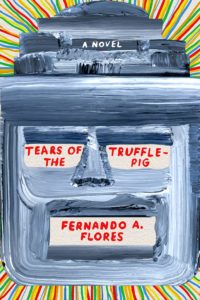 Fernando A. Flores, Tears of the Trufflepig
Fernando A. Flores, Tears of the Trufflepig
MCD x FSG Originals, May 14
One of FSG Originals’ distinctive, beautifully designed offerings, Fernando A. Flores’ debut novel Tears of the Trufflepig is an oddball, picaresque ode to Mexican myth, life on the border, as well as an investigation of loss and a warning against the one percent’s determination to speed up society’s decline. Tears of the Trufflepig takes place in a near-future South Texas where narcotics are legal and the new contraband is Olmec artifacts, shrunken indigenous heads, and “filtered” animals brought back from extinction to feed and amuse the wealthy. If that isn’t enough to draw you in, Trufflepig also contains legends of a long-disappeared indigenous tribe and their object of worship, the curiously-named Trufflepig. It seems that Trufflepig could be one of the most simultaneously wild and sobering books you’ll read in 2019. I’m looking forward to finding out for myself. (MK)
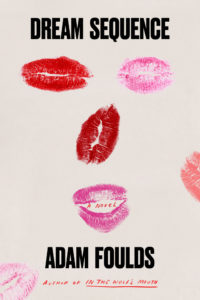 Adam Foulds, Dream Sequence
Adam Foulds, Dream Sequence
FSG, May 14
Henry is a TV actor, who does fine on a show that has a core group of obsessive fans, but who longs for bigger and better things; Kristin, recently divorced, doesn’t think there is anyone bigger or better. than Henry She’s sure the two of them are meant to be together, and decides to fly to London to make it happen. Turns out celebrity isn’t always as great as we think it is. (ET)
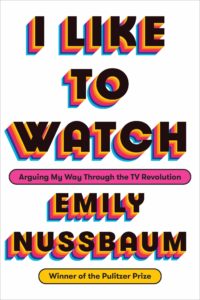 Emily Nussbaum, I Like to Watch: Arguing My Way Through the TV Revolution
Emily Nussbaum, I Like to Watch: Arguing My Way Through the TV Revolution
Random House, May 14
A very exciting book of new and collected essays from your favorite TV critic and mine. (ET)
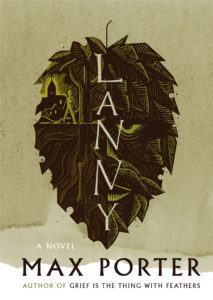 Max Porter, Lanny
Max Porter, Lanny
Graywolf, May 14
Porter’s second novel, after the poetic Grief is the Thing with Feathers, concerns an English town near London, where Dead Papa Toothwort has recently woken up from a nap. He has woken up, and now he is waiting for Lanny. Another fabulist feat from Porter. (ET)
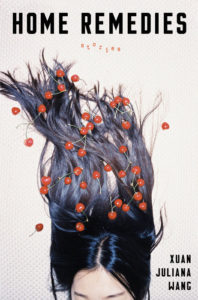 Xuan Juliana Wang, Home Remedies
Xuan Juliana Wang, Home Remedies
Hogarth, May 14, 2019
Wang’s excellent collection is filled with memorable characters, unusual jobs, and the juxtaposition of modern life and cultural heritage. You might have read her brilliant essay on The Cut this past summer, which you can read as an autobiographical introduction to this remarkable debut. (EF)
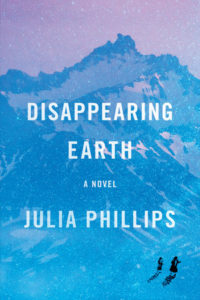 Julia Phillips, Disappearing Earth
Julia Phillips, Disappearing Earth
Knopf, May 21
Fulbright fellow Julia Phillips’s debut begins with the abduction of two girls from a remote Russian peninsula—and goes on to tell the stories of several of the women in their community and how they are affected by the loss in the months afterwards.
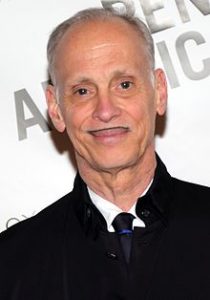 John Waters, Mr. Know-It-All: The Tarnished Wisdom of a Filth Elder
John Waters, Mr. Know-It-All: The Tarnished Wisdom of a Filth Elder
FSG, June 4
Honestly, I thought I couldn’t love John Waters any more, and then I read the subtitle of this book. Another volume of wisdom and wit from our transgressive weirdo sophisticated smut king is always welcome. (ET)
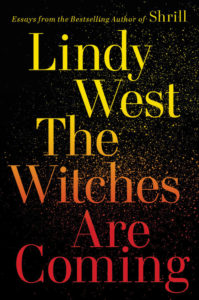 Lindy West, The Witches Are Coming
Lindy West, The Witches Are Coming
Hachette, May 28
“Yes, This Is a Witch Hunt. I’m a Witch and I’m Hunting You.” This op-ed by Lindy West for The New York Times last October was a welcome look at what happens when society stops overlooking the behavior of some predatory men. Now, with a mix of incisive wit and sharp culture criticism, West’s new book promises to untangle the systems of power that have allowed American culture to disempower women and people of color while propping up misogyny, racism, and other forces that propelled our current president to the White House. (CS)
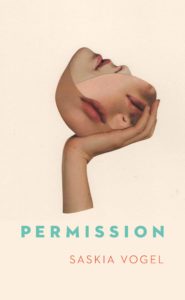 Saskia Vogel, Permission
Saskia Vogel, Permission
Coach House, May 29
If Joan Didion had written about the BDSM community in LA it may have felt a bit like Permission, Saskia Vogel’s evocative debut novel. When Echo’s father dies in a freak accident, grief pulls her under like a rip curl into a world of art models, dominatrixes and sex workers. Many of them are part timers hoping for a break into a Hollywood’s dream machine. Step by step Echo doesn’t just watch, but there are risks. Vogel is deeply perceptive of how a desire to be seen can grow out of acute loss, and how friendships made in enclosed worlds waver due to the way shame can dart in. Like Didion, Vogel is all about atmosphere and can burnish a sentence down to a Stingray’s tail bulb’s perfection. Didion was a tourist though in some of the worlds she explored, like Salvador or a murder scene. On occasion, it was hard for her not to sneer. Vogel only loves her characters, even when they’re making bad decisions, sometimes to an almost utopian degree. For the past five years the LA native has been a big reason why some of Sweden’s best young writers are finally making it into English, novelists like Lina Wolff, Lena Andersson, and Karolina Ramquist. Many of them feminists interested in the warp of sex and love. There’s a quest in all these writers to grapple with the shape of society and what it could be if certain assumptions could be changed. Here with her own work Vogel starts more modestly, but no less ambitiously; she just shows us what is there, barely underground, and by treating it with dignity rather luridness, gives us permission to visit. (JF)
JUNE
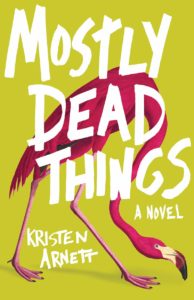 Kristen Arnett, Mostly Dead Things
Kristen Arnett, Mostly Dead Things
Tin House, June 4
If reading Kristen Arnett’s very funny, unexpectedly poignant Lit Hub columns weren’t enough to convince me to read her debut novel, it’s set in a family-run taxidermy shop. Arnett has written, beautifully, about her fraught feelings for her home state of Florida, where this novel is set. Noted Floridian Karen Russell called it “A love letter to Florida and to family, to half-lit swamps and the 7/11,” and I can’t think of any writer more equipped to tackle the humor and devastation of such places and things. (JG)
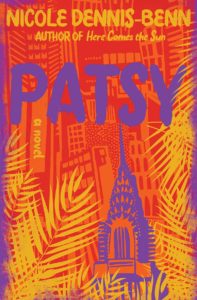 Nicole Dennis-Benn, Patsy
Nicole Dennis-Benn, Patsy
Liveright, June 4
In the second novel from the author of Here Comes the Sun, the eponymous Patsy finally gets a visa to come to America—where her best friend (with whom she is secretly in love) awaits. But of course, Brooklyn is not at all what she thought it would be. For her young daughter, Tru, left behind in Jamaica, life isn’t all that great either. You can read an excerpt here. (ET)
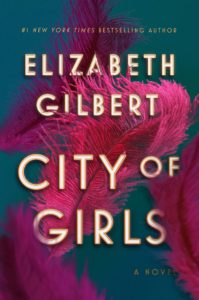 Elizabeth Gilbert, City of Girls
Elizabeth Gilbert, City of Girls
Riverhead, June 4
Whatever you think of Elizabeth Gilbert (opinions are many and varied!), there’s no denying that a new book from her is a major literary event. And this novel is an event—a sexy, scandalous love story set in the 1940s NYC theater world. Can’t wait. (ET)
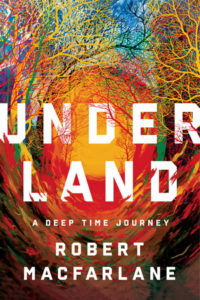 Robert Macfarlane, Underland
Robert Macfarlane, Underland
W. W. Norton, June 4
Another book about the underground this year, this one from celebrated nature writer Macfarlane, again investigating our relationship with the world beneath, but focusing on the notion of “deep time”—geologic time under the earth’s surface. (ET)
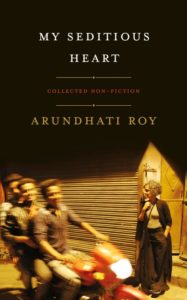 Arundhati Roy, My Seditious Heart
Arundhati Roy, My Seditious Heart
Haymarket, June 4
It was never true that she went away. For 20 years, between God of Small Things and The Ministry of Utmost Happiness, Arundhati Roy was a prolific intervening essayist in India. Her gifts for storytelling and at grasping the ironies of history made her an essential essayist on nuclear development and dam building, on rape culture and the violent abuse and murder of Muslims—as well as of minority populations. Whereas Marilynne Robinson and Toni Morrison use their essays to gumshoe the real meaning of American history, Roy has acted as a constant roving sense of context for India during a time of tumult and rapid change. Now that these works are available under one cover for the first time, Roy’s nonfiction makes it clear just how constantly, fabulously engaged in public life she has been, even when it nearly cost her her life. Her dozen or so small books and pamphlets total up to 1,000 pages. Take them home and read them slowly, there are few writers in the world who make the connections between poverty and land use and climate change and sexism that Roy sees here. Her ability to describe the complexity of problems which India faces, and by extension the world, is astonishing and bracing and necessary. (JF)
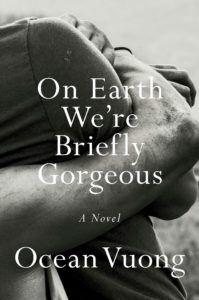 Ocean Vuong, On Earth We’re Briefly Gorgeous
Ocean Vuong, On Earth We’re Briefly Gorgeous
Penguin Press, June 4
The debut novel by the acclaimed poet (Night Sky With Exit Wounds, winner of the 2018 T.S. Eliot Prize) takes the form of a letter from a son to a mother who can’t read, in the hopes of unraveling their shared path. If it’s anything like Vuong’s poetry, it’ll be an emotional knock-out.
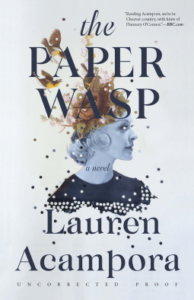 Lauren Acampora, The Paper Wasp
Lauren Acampora, The Paper Wasp
Grove Press, June 11
In her debut novel, Lauren Acampora traces the dark path of a friendship between two ambitious women, Abby and Elise, and their involvement with a creative institute named the Rhizome, founded by Abby’s favorite filmmaker, the cult figure Auguste Perren. If that’s not knotty enough, the stakes are complicated further by Abby’s visionary, often premonitory dreams that she keeps a secret. The Paper Wasp looks set to be a complex, psychologically acute tale of suspense and creative ambition, every bit as eerie and beguiling as its cover. (MK)
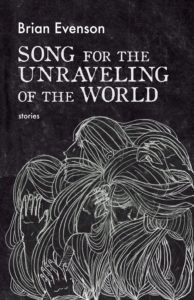 Brian Evenson, Song for the Unraveling of the World
Brian Evenson, Song for the Unraveling of the World
Coffee House Press, June 11
Henry Prize winner and Shirley Jackson Award finalist Brian Evenson is back with a new collection of short stories, the excellently (and possibly appropriately) named Song for the Unraveling of the World. In keeping with his genre-straddling work, the collection blends literary fiction, sci-fi, and horror; its eerie, paranoiac offerings include a newborn’s absent face that appears on the back of someone else’s head, a filmmaker going to gruesome lengths to achieve the silence he wants for his final scene, and a therapist who begins to appear in a patient’s room late at night. (MK)
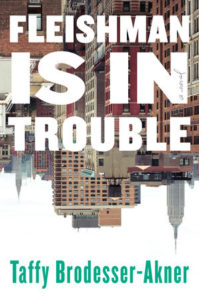 Taffy Brodesser-Akner, Fleishman is in Trouble
Taffy Brodesser-Akner, Fleishman is in Trouble
Random House, June 18
I am a huge fan of Brodesser-Akner’s razor sharp-yet-compassionate, delightfully self-deprecating profiles (if haven’t read her excellent piece on Gwyneth Paltrow, please do so immediately), so I can’t wait to read her debut novel. Its protagonist is a divorcé whose wife disappears one day, leaving him to navigate full-time parenthood as well as the mystery of where she’s gone. I have no doubt it will be hilarious, painful, and gorgeous. (JG)
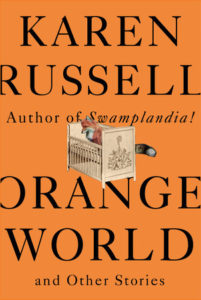 Karen Russell, Orange World and Other Stories
Karen Russell, Orange World and Other Stories
Knopf, June 18
We’re living through a tremendous era for weird fiction. Stories that combine fantasy and horror and gothic genres and make of them something new. From Mariana Enriquez and George Saunders to Samanta Schweblin and Helen Oyeyemi, the limits of realism haven’t been this exposed for what they’ve upheld in many decades. Amidst this leading pack of talents Karen Russell writes the most like she’s on fire, as in: this close to revelations. Orange World is her best collection yet. Her imagination’s baroque syntax has been planed down to the absolute essentials, allowing the power of her vision to speak for itself. In stories like “Prospectors,” where two women light out for Oregon during the Depression and rob houses to stay afloat, or Orange World, about a woman who strikes a deal to breastfeed the devil to in exchange for his protection, you can see the flaming hellscape of America today flicking in a mirror’s refracted lens. A country of wanton scorn for poverty and parents facing awful decisions. The sense of our broken estate with nature and the past saturate this book like dread. But as always with Russell’s work these concerns make themselves felt through a hilarity that borders on pleading, and through the bounce and perfection of every line. “He had celery-green eyes and a stutter that had been corrected at the state’s expense,” Russell writes of the teenaged hero of “Bog Girl,” who falls in love with a 2,000-year-old girl thawed out in northern tundra. The kid’s dad makes fun of him for dating an “older woman,” but as the story continues it deepens. Why can’t we see something as eternal as love is being lost because of how we live today? This is prophetic work written with clarifying fury. (JF)
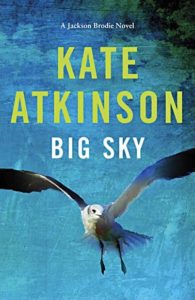 Kate Atkinson, Big Sky
Kate Atkinson, Big Sky
June 25, Little, Brown
Atkinson’s latest Jackson Brodie novel has the PI relocated to a “quiet seaside town” that has something sinister brewing beneath the surface: a human trafficking business. Fans of the series, take note! (ET)
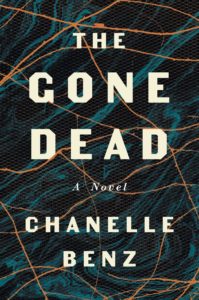 Chanelle Benz, The Gone Dead
Chanelle Benz, The Gone Dead
Ecco, June 25
Henry Prize winner Benz follows up her excellently-titled collection The Man Who Shot Out My Eye is Dead with the story of a homecoming: a woman returns to the Mississippi town she left years before to sort out her father’s legacy—and the mystery of what happened to her on the day of his death.
JULY
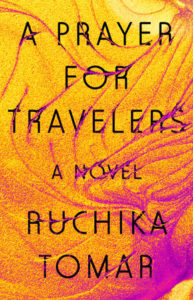 Ruchika Tomar, A Prayer for Travelers
Ruchika Tomar, A Prayer for Travelers
Riverhead, July 9, 2019
The Nevada-set debut novel from California writer Tomar is an indelible portrait of love, grief, and trauma. When Cale, a bookish loner raised by an ailing grandfather, reconnects with Penélope Reyes, a charismatic former classmate and all-around hustler, the two girls become inseparable—until one shocking act of violence upends their world. When Penny suddenly disappears, an already grieving Cale must set off on a dangerous trek across the desert to find her friend. (DS)
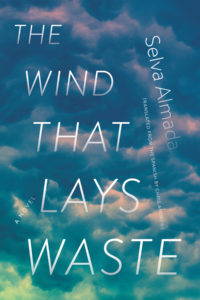 Selva Almada, The Wind That Lays Waste
Selva Almada, The Wind That Lays Waste
Graywolf Press, July 9
Set over the course of a single, long day, Selva Almada’s debut novel The Wind That Lays Waste explores the tensions and connections that ebb and flow between people in a dire situation. The novel tells the story of Reverend Pearson, who is evangelizing across the Argentinian countryside with his daughter Leni when their car breaks down. The pair end up in the home of an aging mechanic named Gringo Bauer and a young boy named Tapioca. Through it all, a storm grows and finally bursts across the plain, forcing curiosity, intrigue, and eventually a sort of intimacy, to grow between these four characters. (MK)
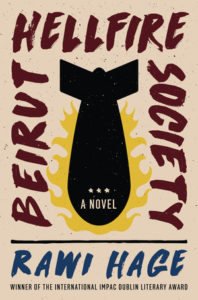 Rawi Hage, Beirut Hellfire Society
Rawi Hage, Beirut Hellfire Society
W. W. Norton, July 16
Beirut, 1978. Pavlov’s father has just died, and Pavlov has inherited his undertaking business. Soon he is visited by a member of the Hellfire Society, a group that, among other things, arranges burials for those who have been denied them on grounds of religion or sexuality. Pavlov must take over for his father and bear witness to life, death, and other atrocities. (ET)
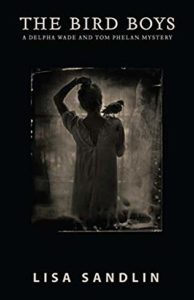 Lisa Sandlin, The Bird Boys
Lisa Sandlin, The Bird Boys
Cinco Puntos, July 16
In Sandlin’s second to feature her ex-con-turned-private-eye Delpha and her sympathetic boss Phelan, the two take on a case involving blood, brothers, and Beaumont’s darkest secrets. The Texan on staff is confident in saying that Lisa Sandlin’s series is the best thing to ever come out of Beaumont. You don’t believe me? Take a visit there. And try to breathe. (MO)
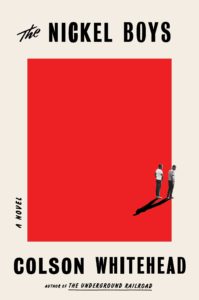 Colson Whitehead, The Nickel Boys
Colson Whitehead, The Nickel Boys
Doubleday, July 16, 2019
Even this far out I think it’s safe to say that The Nickel Boys—Colson Whitehead’s follow-up to the bestselling, critically acclaimed, prize circuit-dominating juggernaut that was The Underground Railroad—will be one of the most talked about books of 2019. The novel, sure to be another trenchant and compelling examination of racism and brutality in America, is the story of two young boys in Jim Crow-era Florida—one idealistic and hopeful, the other jaded and skeptical—sentenced to serve time in nightmarish reform school staffed by sadistic guards and corrupt officials, and the lives they go on to lead when they emerge from this crucible. (DS)
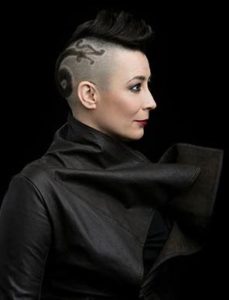 Maria Dahvana Headley, Beowulf: A New Translation
Maria Dahvana Headley, Beowulf: A New Translation
MCD x FSG Originals, July 23, 2019
It hasn’t been that long since I read Maria Dahvana Headley’s The Mere Wife, a searing feminist reimagining of Beowulf and I’m already hungry for more. If you’re one of the many people who feel the same way, there’s excellent news—among 2019’s literary offerings is a new translation of Beowulf by Maria Dahvana Headley. The new translation will highlight elements of the epic poem that are rarely brought to light, transforming it from a story of heroes and monsters into something far more complex. I was lucky enough to attend an event where Maria Dahvana Headley revealed that the translation also grapples with machismo and bro culture in the epic poem, and that it opens with the word, “Bro.” That’s enough of a hook for me, and as far as I’m concerned, July and the radical new Beowulf can’t come soon enough. (MK)
AUGUST AND BEYOND
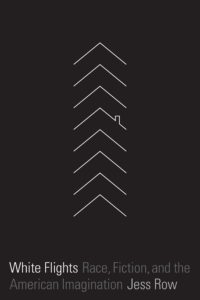 Jess Row, White Flights
Jess Row, White Flights
Graywolf, August 6
A much-needed investigation into whiteness in American fiction and culture from the author of Your Face in Mine, White Flights compares the notion of “white flight” in the world to a kind of literary “white flight”—the habit of white authors to set their work in isolated, non-diverse spaces, and asks how we might re-approach writing as “a reparative act.” (ET)
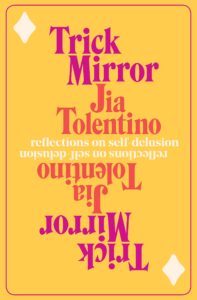 Jia Tolentino, Trick Mirror
Jia Tolentino, Trick Mirror
Random House, August 6
You heard it right: Jia Tolentino, your culture captain and mine, is publishing a book of nine original essays in 2019. Random House describes the book as “an enlightening, unforgettable trip through the river of self-delusion that surges just beneath the surface of our lives,” which I don’t doubt for a minute, and which honestly, we all desperately need. “The book is loosely organized around the concept of self-delusion—coming out of this animating idea that there are a lot of new incentives to be hyper-self-conscious, to build up a lot of cognitive dissonance around the self,” Tolentino said in an interview. “Social media is programmatically set up to make your identity seem like the home base for the entire world. Three of the essays are going to be personal, sort of trying to figure out how I have been fooling myself. I was on a reality show when I was 16—spent a month in Puerto Rico filming it—and I’m going to finally watch it and write about it.” Apparently it was like the Real World/Road Rules Challenge except with high schoolers, to which I say: tell me more. (ET)
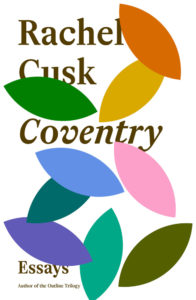 Rachel Cusk, Coventry
Rachel Cusk, Coventry
FSG, August 8
From the brilliant mind that brought us the Outline trilogy comes a collection of essays on family, politics, and, well, does it even matter what else? Won’t you read it anyway? Cusk has a sharp eye and a sharp tongue, and she’s not afraid to use them both. To tide you over in case you missed it: the Granta essay that the collection is named after. (KY)
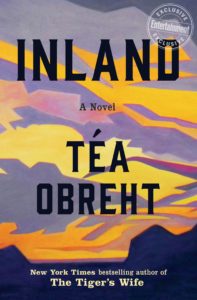 Téa Obreht, Inland
Téa Obreht, Inland
Random House, August 13
Dare I say: holy crap. EIGHT YEARS after her glorious debut The Tiger’s Wife, Obreht is finally back with what her publishers call “a stunning tale of perseverance” set in the Arizona Territory in 1893. Yes friends, it’s a Western. “Some years ago, while doing research in the Southwest, I happened upon a frontier story about the surprising intersection of two very different journeys,” Obreht told EW. “Puzzling out how such disparate lives could come together, and what effect each might have on the other, led me to Inland. I’ve always been drawn to the small, personally meaningful stories that support a life, the kinds of stories people tell themselves about themselves, and the way place makes us who we are—often at great cost.”
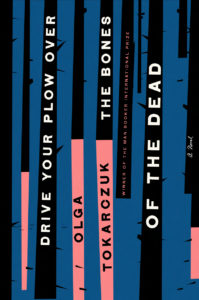 Olga Tokarczuk, Drive Your Plow Over the Bones of the Dead
Olga Tokarczuk, Drive Your Plow Over the Bones of the Dead
Riverhead, August 13, 2019
Writer, activist, and public intellectual Olga Tokarczuk has been renowned in her native Poland and across Europe for over two decades, but it was only with her 2018 Man Booker International Prize win for the critically-acclaimed Flights that she became a (literary) household name in the English-speaking world. In August, Tokarczuk fans will be treated to another newly translated gem, the supremely titled Drive Your Plow Over the Bones of the Dead, which is billed as “a provocative exploration of the tug between sanity and madness, justice and tradition, autonomy and fate.” (DS)
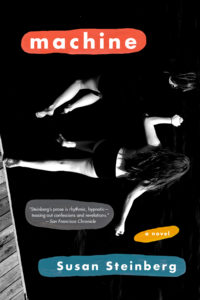 Susan Steinberg, Machine
Susan Steinberg, Machine
Graywolf, August 20
Susan Steinberg takes everything you loved about her short story collections (Spectacle, anyone?) and brings them to this new tragedy: a hazy summer night in which one girl drowned. The voice of the story—sometimes singular, sometimes with other echoes—will guide and haunt you as it tries to make sense of what happened. (KY)
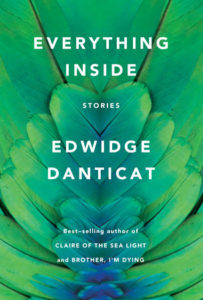 Edwidge Danticat, Everything Inside
Edwidge Danticat, Everything Inside
Knopf, August 27
Edwidge Danticat gutted me with her honesty and scope in Brother, I’m Dying, and I’m excited to see her language for emotion and her imagination run wild in this collection of short stories. (KY)
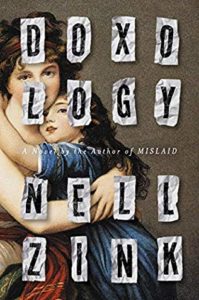 Nell Zink, Doxology
Nell Zink, Doxology
Ecco, August 27
Even if Nell Zink wasn’t a charmingly irascible semi-public presence (on Twitter and elsewhere) I’d be excited for her new novel. Zink is one of those particular writers whose propulsive readability is powered by an immediately recognizable style—sardonic, slyly unreliable, papercut sharp—that never fails to leave a mark. (JD)
 Deborah Levy, The Man Who Knew Everything
Deborah Levy, The Man Who Knew Everything
Bloomsbury, September 3
If you’ve blazed through Elena Ferrante, Lucia Berlin and Clarice Lispector and yearn for another wild writer of ferocious and hilarious precision, look no further. Two-time Man Booker finalist Deborah Levy has been one of the publishing world’s great comeback stories of the last decade, roaring back into view with her exquisite country house novel, Swimming Home, and a duet of memoirs that ought to be on any budding writer’s nightstand. Her new novel pivots between two car accidents on Abbey Road, one in 1989, the other in 2016, the latter of which leaves her peripatetic hero in a state of bewildering limbo, maybe seeing ghosts. (JF)
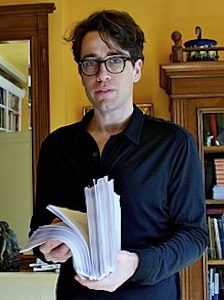 Benjamin Moser, Sontag
Benjamin Moser, Sontag
Ecco, September 3
Benjamin Moser, whose acclaimed biography of Brazilian writer Clarice Lispector was nominated for the National Book Critics Circle Award in 2009, was doing research for his authorized biography of Susan Sontag for three years before he even started writing. In a 2014 interview, Moser said he’d been traveling from “Bosnia to Oahu and almost everywhere in between, and now I have to make sense of a very complicated and difficult life.” This is a compelling pairing of writer and subject, certainly my most anticipated biography of 2019. (AR)
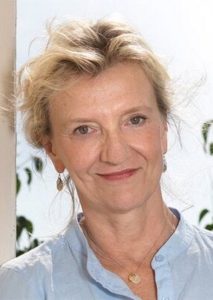 Elizabeth Strout, Olive, Again
Elizabeth Strout, Olive, Again
Random House, September 3
Elizabeth Strout’s sequel to her beloved, Pulitzer Prize-winning novel-in-stories Olive Kitteridge will hit shelves this fall, and chronicle the next decade in its eponymous heroine’s life. “It turns out—I just wasn’t done with Olive,” Strout said in a press release. “It was like she kept poking me in the ribs, so I finally said, ‘Okay, okay . . . ‘” (ET)
 Naja Marie Aidt, Carl’s Book
Naja Marie Aidt, Carl’s Book
Coffee House, September 9
This astonishing memoir is one of the rawest and most intelligent books about grief you will ever read. It is also a warm, vivid portrait of Danish writer Aidt’s son, a chef and searcher who died tragically in his early twenties when a home-made batch of hallucinogenics led to a terrible accident. Drawing on the author’s diaries in the aftermath, poets of lacunae like Anne Carson and Ingrid Christensen, and narrating the boy’s life and upbringing, it is a powerful formal assertion of the heartbreaking illegibility of loss, even as all one wants to do with the missing is keep them alive, present, somehow. (JF)
 Margaret Atwood, The Testament
Margaret Atwood, The Testament
Nan A. Talese, September 10
The minute the van door slammed on Offred at the conclusion of The Handmaid’s Tale, it was only a matter of time before Atwood would bring us back to Gilead. Now in the middle of a global movement by right wing governments to get there first, in real life, Atwood has at long last announced a sequel is on its way. It will be narrated by three female characters and takes place 15 years after Offred’s last scene and that’s about all we know about the book until September. The countdown will be hard but it may give one hope that, just as Atwood turned out a new paradigm of sexism in the abortion doctor-murdering 80s, chances seem high that in this age of surprise demolition, she’ll prove a novel of ideas and storytelling can still make us see and feel anew. (JF)
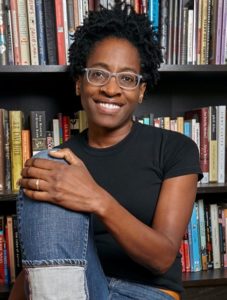 Jacqueline Woodson, Red at the Bone
Jacqueline Woodson, Red at the Bone
Riverhead, September 17
In October, we learned that National Book Award winner Woodson would publish two adult books with Riverhead, and this is the first. Scant details on this one, but the publisher calls it “an extraordinary new novel about two black families from different social classes, and how the decisions of the young people in the families have long-lasting consequences for generations to come.” Good enough for me. (ET)
 László Krasznahorkai, tr. Ottilie Mulzet, Baron Wenckeim’s Homecoming
László Krasznahorkai, tr. Ottilie Mulzet, Baron Wenckeim’s Homecoming
New Directions, September 24
“I’ve said a thousand times that I always wanted to write just one book,” Krasznahorkai told The Paris Review. “I wasn’t satisfied with the first, and that’s why I wrote the second. I wasn’t satisfied with the second, so I wrote the third, and so on. Now, with Baron, I can close this story. With this novel I can prove that I really wrote just one book in my life. This is the book—Satantango, Melancholy, War and War, and Baron. This is my one book.” He swears that he will never write another novel after this one. “When you read it, you’ll understand,” he says. “Baron Wenckheim’s Homecoming must be the last.” Seems like a good time for a massive Krasznahorkai re-read.
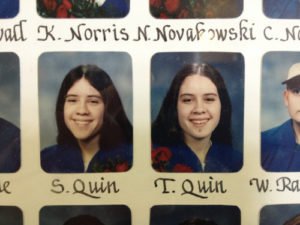 Tegan Quin and Sara Keirsten Quin, High School
Tegan Quin and Sara Keirsten Quin, High School
MCD, September 24, 2019
After eight studio albums, countless collaborations and tours, and more than two decades of making music (first under the name “Sara and Tegan”!), the origin of Tegan and Sara is now the stuff of myth, particularly for a generation of queer adults who grew up alongside them during the expansion of LGBTQ rights in the U.S. Now, the two Canadian rockers will bring their earliest stories to a memoir on stumbling towards adulthood and everything they each encountered along the way. Having spent a not-small part of my life blasting their music, I couldn’t be more excited to hear more from them. (CS)
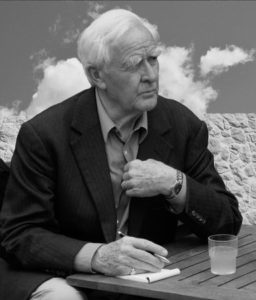 John le Carré, Agent Running in the Field
John le Carré, Agent Running in the Field
Viking, October 22
John le Carré’s 25th novel is set in London in 2018, and will apparently be tackling “the division and rage at the heart of our modern world.” Otherwise, we’ve got very few details to work with: the publisher tells us that the protagonist, “in a desperate attempt to resist the political turbulence swirling around him, makes connections that will take him down a very dangerous path.” Which tells us exactly nothing, so we’ll all just have to wait patiently—or steal an advance copy. (ET)
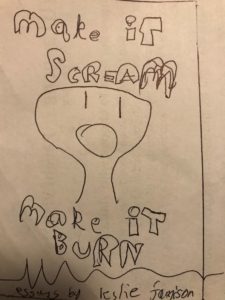 Leslie Jamison, Make It Scream Make It Burn
Leslie Jamison, Make It Scream Make It Burn
October
From my internet sleuthing, the only information I can find about Leslie Jamison’s new book is that it’s an essay collection (which, presumably, includes this title essay) and that the author’s stepdaughter has already created the best cover art of 2019 for it. (DS)



